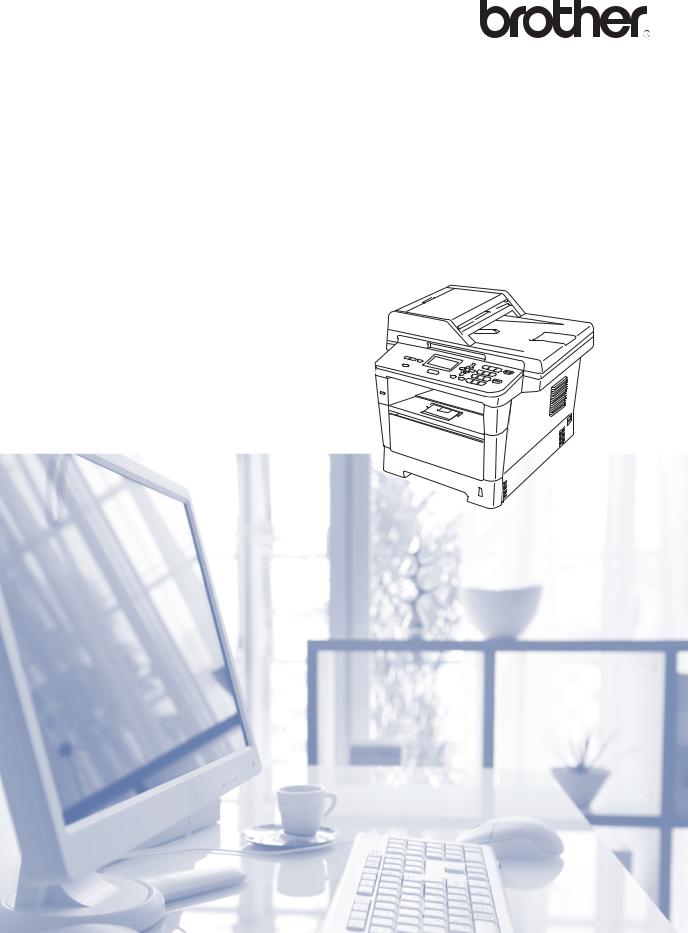
Basic User’s Guide
DCP-8110D
DCP-8110DN
DCP-8155DN
Not all models are available in all countries.
Version 0
ARL/ASA/NZ/SAF/GLF
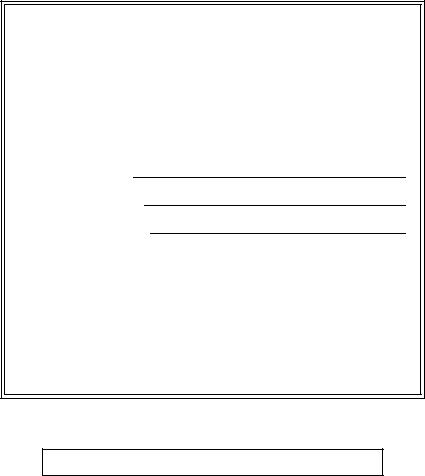
If you need to call Customer Service
Please complete the following information for future reference:
Model Number: DCP-8110D / DCP-8110DN / DCP-8155DN
(Circle your model number)
Serial Number: 1
Date of Purchase:
Place of Purchase:
1The serial number is on the back of the unit. Retain this User’s Guide with your sales receipt as a permanent record of your purchase, in the event of theft, fire or warranty service.
Register your product on-line at
http://www.brother.com/registration/
© 2012 Brother Industries, Ltd. All rights reserved.

User's Guides and where do I find them?
|
|
|
Which Guide? |
What's in it? |
Where is it? |
Product Safety |
Read this Guide first. Please read the Safety |
Printed / In the box |
Guide |
Instructions before you set up your machine. |
|
|
See this Guide for trademarks and legal |
|
|
limitations. |
|
Quick Setup Guide |
Follow the instructions for setting up your |
Printed / In the box |
|
machine and installing the drivers and |
|
|
software for the operating system and |
|
|
connection type you are using. |
|
Basic User's Guide |
Learn the basic Copy, Scan and Direct Print |
Printed / In the box |
|
operations and how to replace |
|
|
consumables. See troubleshooting tips. |
|
Advanced User's |
Learn more advanced operations: Copy, |
PDF file / Installer CD-ROM / |
Guide |
security features, printing reports and |
In the box |
|
performing routine maintenance. |
|
Software User's |
Follow these instructions for Printing, |
PDF file / Installer CD-ROM / |
Guide |
Scanning, Network Scanning and using the |
In the box |
|
Brother ControlCenter utility. |
|
Network User's |
This Guide provides useful information |
PDF file / Installer CD-ROM / |
Guide |
about wired network settings and security |
In the box |
(for DCP-8110DN and |
settings using the Brother machine. You can |
|
also find supported protocol information for |
|
|
DCP-8155DN) |
|
|
your machine and detailed troubleshooting |
|
|
|
|
|
|
tips. |
|
Google Cloud Print |
This Guide provides details on how to |
PDF file / Brother Solutions |
Guide |
configure your Brother machine to a Google |
Center 2 |
(for DCP-8110DN and |
account and use Google Cloud Print |
|
services for printing over the Internet from |
|
|
DCP-8155DN) |
|
|
devices using Gmail™ for mobile, GOOGLE |
|
|
|
|
|
|
DOCS™ for mobile and applications for the |
|
|
Chrome OS. |
|
Mobile Print/Scan |
This Guide provides useful information |
PDF file / Brother Solutions |
Guide for Brother |
about printing JPEG and PDF 1 files from |
Center 2 |
iPrint&Scan |
your mobile device and scanning from your |
|
(for DCP-8110DN and |
Brother machine to your mobile device when |
|
DCP-8155DN) |
connected on a Wi-Fi network. |
|
|
|
|
1PDF printing is not supported on Windows® Phone.
2Visit us at http://solutions.brother.com/.
i
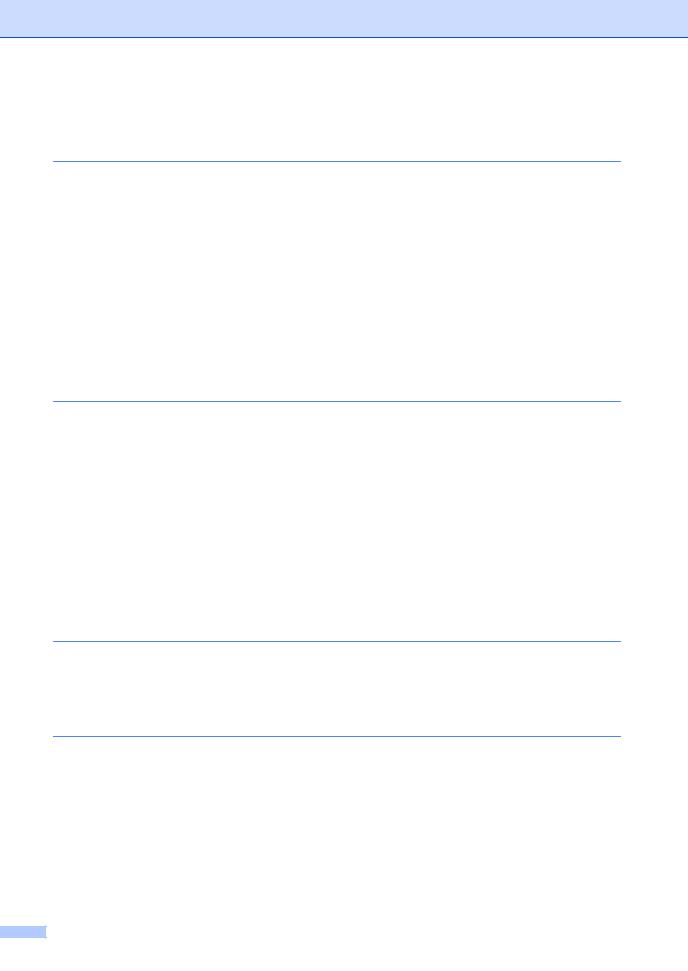
Table of Contents
(Basic User’s Guide)
1 |
General information |
1 |
|
Using the documentation ....................................................................................... |
1 |
|
Symbols and conventions used in the documentation .................................... |
1 |
|
Accessing the Advanced User's Guide, Software User's Guide |
|
|
and Network User's Guide.................................................................................. |
2 |
|
Viewing Documentation ................................................................................... |
2 |
|
How to access the User's Guides for Advanced Features..................................... |
4 |
|
Accessing Brother Support (Windows®)................................................................ |
4 |
|
Accessing Brother Support (Macintosh) ................................................................ |
5 |
|
Control panel overview .......................................................................................... |
6 |
|
Data LED indications ....................................................................................... |
8 |
|
Volume settings ..................................................................................................... |
9 |
|
Beeper volume ................................................................................................ |
9 |
2 |
Loading paper |
10 |
|
Loading paper and print media ............................................................................ |
10 |
|
Loading paper in the standard paper tray and the optional lower tray .......... |
10 |
|
Loading paper in the multi-purpose tray (MP tray) ........................................ |
12 |
|
Unscannable and unprintable areas .............................................................. |
16 |
|
Paper settings...................................................................................................... |
17 |
|
Paper Type .................................................................................................... |
17 |
|
Paper Size ..................................................................................................... |
17 |
|
Tray Use in COPY mode ............................................................................... |
18 |
|
Tray Use in print mode .................................................................................. |
18 |
|
Acceptable paper and other print media.............................................................. |
19 |
|
Type and size of paper .................................................................................. |
19 |
|
Handling and using special paper ................................................................. |
21 |
3 |
Loading documents |
24 |
|
How to load documents ....................................................................................... |
24 |
|
Using the automatic document feeder (ADF) ................................................ |
24 |
|
Using the scanner glass ................................................................................ |
25 |
4 |
Making copies |
26 |
|
How to copy ......................................................................................................... |
26 |
|
Stop copying .................................................................................................. |
26 |
|
Copy settings ................................................................................................. |
26 |
ii
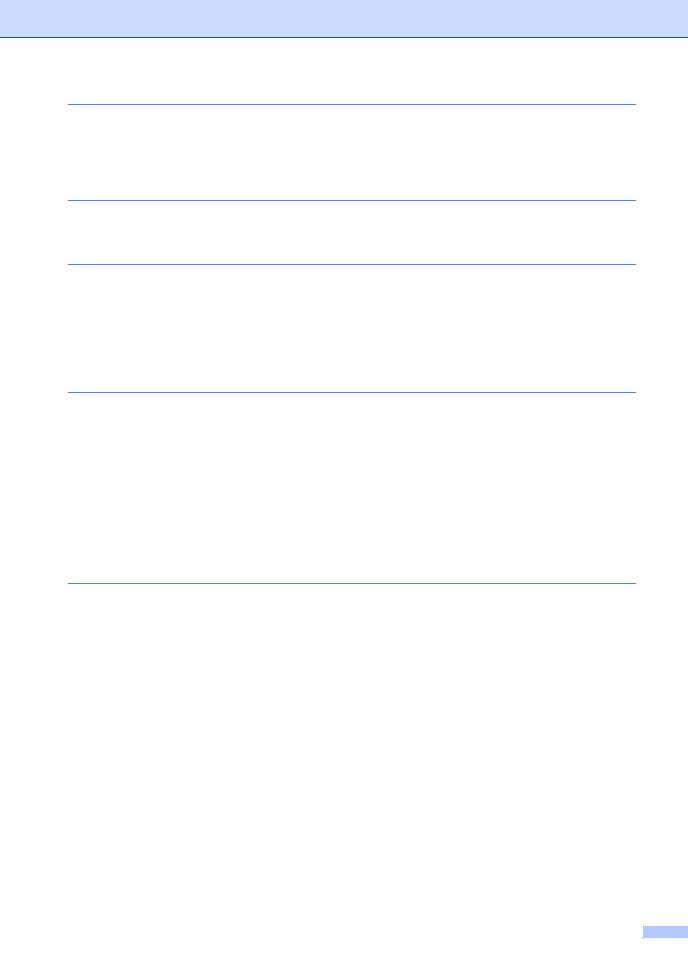
5 |
Printing data from a USB Flash memory drive or digital camera |
|
|
supporting mass storage |
27 |
|
Creating a PRN file for direct printing .................................................................. |
27 |
|
Printing data directly from the USB Flash memory drive or digital camera |
|
|
supporting mass storage .................................................................................. |
28 |
6 |
How to print from a computer |
31 |
|
Printing a document............................................................................................. |
31 |
7 |
How to scan to a computer |
32 |
|
Scanning a document as a PDF file using ControlCenter4 (Windows®) ............. |
32 |
|
Changing the SCAN key settings ........................................................................ |
35 |
|
Before scanning............................................................................................. |
35 |
|
SCAN key settings......................................................................................... |
35 |
|
Scanning using the SCAN key ...................................................................... |
37 |
A |
Routine maintenance |
38 |
|
Replacing the consumable items......................................................................... |
38 |
|
Replacing the toner cartridge ........................................................................ |
41 |
|
Replacing the drum unit................................................................................. |
47 |
|
Cleaning and Checking the machine................................................................... |
52 |
|
Cleaning the outside of the machine ............................................................. |
52 |
|
Cleaning the scanner glass ........................................................................... |
53 |
|
Cleaning the corona wire............................................................................... |
54 |
|
Cleaning the drum unit .................................................................................. |
56 |
|
Cleaning the paper pick-up rollers................................................................. |
60 |
B |
Troubleshooting |
62 |
|
Identifying your problem ...................................................................................... |
62 |
|
Error and maintenance messages....................................................................... |
63 |
|
Document Jams................................................................................................... |
69 |
|
Document is jammed in the top of the ADF unit ............................................ |
69 |
|
Document is jammed under the document cover .......................................... |
69 |
|
Removing small documents jammed in the ADF........................................... |
70 |
|
Document is jammed at the output tray......................................................... |
70 |
|
Paper Jams.......................................................................................................... |
71 |
|
Paper is jammed in the MP tray .................................................................... |
71 |
|
Paper is jammed in paper tray 1 or tray 2 ..................................................... |
72 |
|
Paper is jammed at the back of the machine ................................................ |
73 |
|
Paper is jammed inside the machine............................................................. |
76 |
|
Paper is jammed in the duplex tray ............................................................... |
80 |
|
If you are having difficulty with your machine ...................................................... |
82 |
|
Improving the print quality.................................................................................... |
88 |
|
Machine Information ............................................................................................ |
95 |
|
Checking the Serial Number.......................................................................... |
95 |
|
Reset functions.............................................................................................. |
95 |
|
How to reset the machine.............................................................................. |
95 |
iii
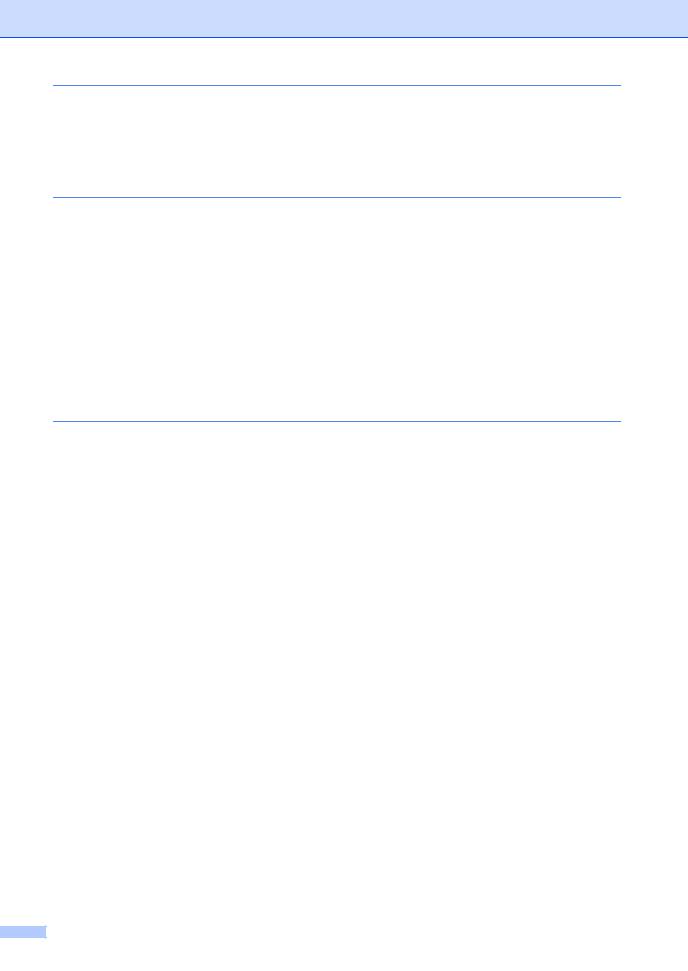
C |
Menu and features |
96 |
|
On-screen programming...................................................................................... |
96 |
|
How to access the menu mode ..................................................................... |
96 |
|
Menu table ........................................................................................................... |
97 |
|
Entering text....................................................................................................... |
110 |
D |
Specifications |
112 |
|
General .............................................................................................................. |
112 |
|
Document Size .................................................................................................. |
114 |
|
Print media......................................................................................................... |
115 |
|
Copy .................................................................................................................. |
116 |
|
Scanner ............................................................................................................. |
117 |
|
Printer ................................................................................................................ |
118 |
|
Direct Print feature............................................................................................. |
119 |
|
Computer requirements .................................................................................... |
120 |
|
Consumable items ............................................................................................. |
122 |
|
Interfaces ........................................................................................................... |
123 |
|
Network (LAN) ................................................................................................... |
124 |
E |
Index |
125 |
iv
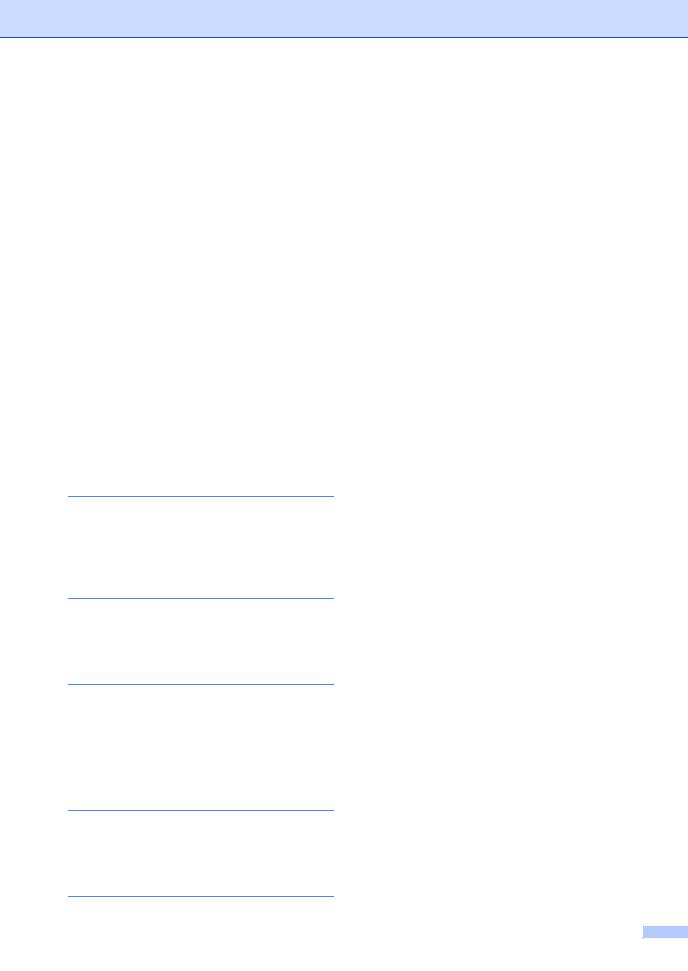
Table of Contents
(Advanced User's Guide)
You can view the Advanced User's Guide on the Installer CD-ROM.
The Advanced User's Guide explains the following features and operations.
1 General Setup |
|
D Index |
IMPORTANT NOTE Memory storage
Set Daylight Saving Time Ecology features
Quiet mode feature LCD Contrast Glass ScanSize User Settings List
Network Configuration Report (for DCP-8110DN and DCP-8155DN)
2 Security features
Secure Function Lock 2.0 (for
DCP-8110DN and DCP-8155DN)
Setting Lock
3 Making copies
Copy settings
Duplex (2-sided) copying
A Routine maintenance
Cleaning and checking the machine
Replacing periodic maintenance parts
Packing and shipping the machine
B Options
Optional paper tray (LT-5400)
Memory board
C Glossary
v
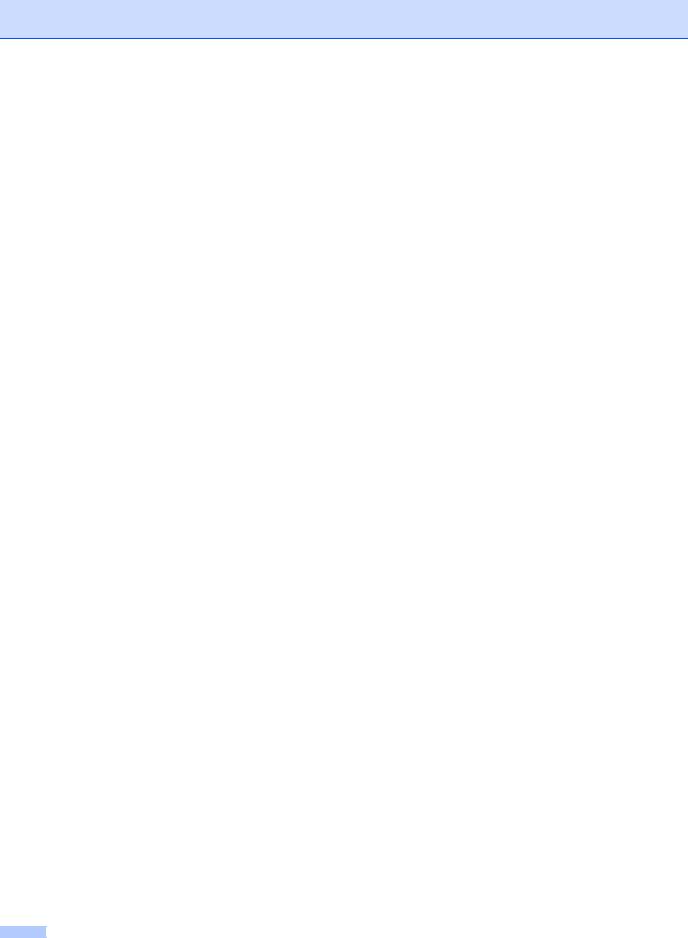
vi
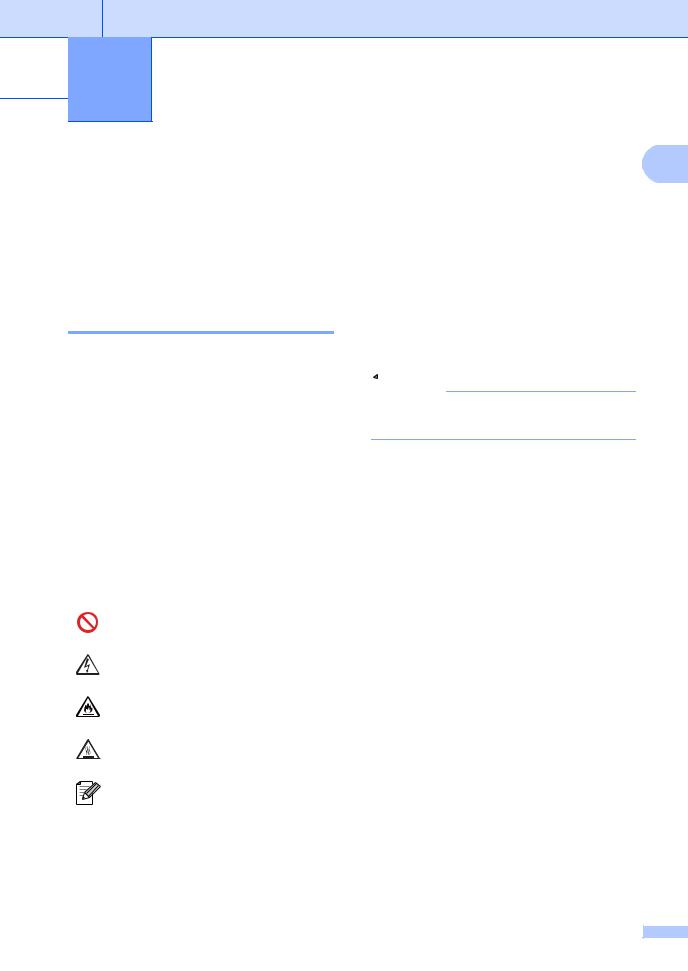
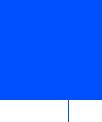 1 General information
1 General information
Using the documentation
Thank you for buying a Brother machine! Reading the documentation will help you make the most of your machine.
Symbols and conventions used in the documentation
The following symbols and conventions are used throughout the documentation.
 WARNING
WARNING
WARNING indicates a potentially hazardous situation which, if not avoided, could result in death or serious injuries.
Bold |
Bold style identifies keys on the |
1 |
|
machine's control panel or on the computer screen.
Italics Italicized style emphasizes an important point or refers you to a related topic.
Courier Courier New font identifies the New messages shown on the LCD
of the machine.
Follow all warnings and instructions marked on the product.
 Note
Note
Most of the illustrations in this User's Guide show the DCP-8155DN.
 Important
Important
Important indicates a potentially hazardous situation which, if not avoided, may result in damage to property or loss of product functionality.
Prohibition icons indicate actions that must not be performed.
Electrical Hazard icons alert you to a possible electrical shock.
Fire Hazard icons alert you to the possibility of fire.
Hot Surface icons warn you not to touch machine parts that are hot.
Notes tell you how you should respond to a situation that may arise or give tips about how the current operation works with other features.
1
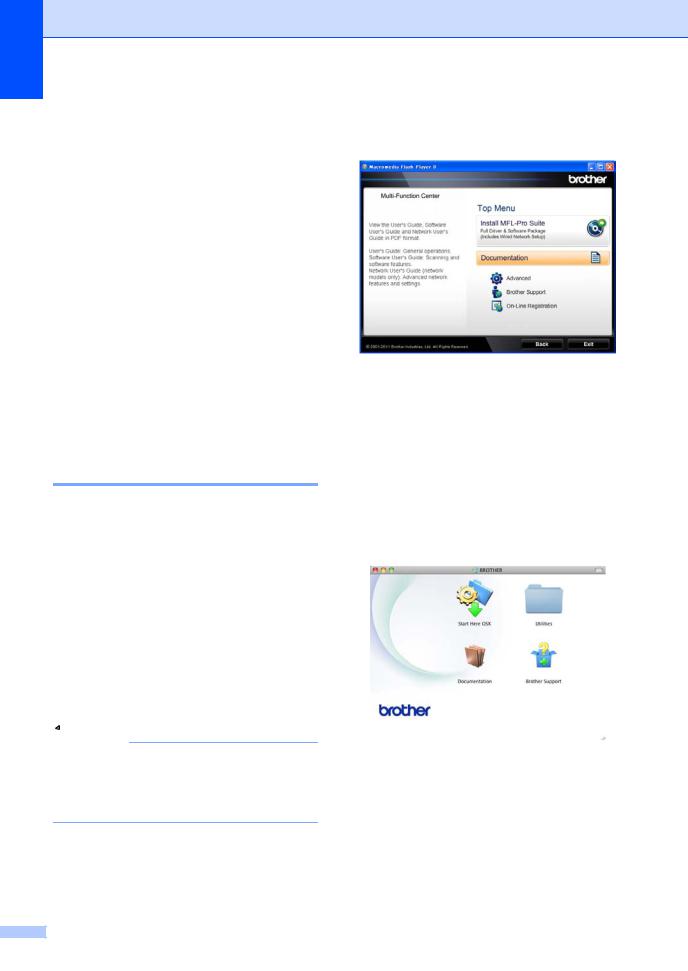
Chapter 1
Accessing the
Advanced User's
Guide, Software User's
Guide and Network
User's Guide
This Basic User's Guide does not contain all the information about the machine such as how to use the advanced features for Copy,
Printer, Scanner and Network 1. When you are ready to learn detailed information about these operations, read the
Advanced User's Guide,
Software User's Guide and
Network User's Guide that are on the Installer CD-ROM.
1 DCP-8110DN and DCP-8155DN only
Viewing Documentation
Viewing Documentation (Windows®)
To view the documentation, from the Start menu, select Brother, DCP-XXXX (where XXXX is your model name) from the programs list, and then choose User’s Guides.
If you have not installed the software, you can find the documentation on the Installer CD-ROM by following the instructions below:
a Turn on your computer. Insert the Installer CD-ROM into your CD-ROM drive.
 Note
Note
If the Brother screen does not appear automatically, go to My Computer (Computer), double-click the CD-ROM icon, and then double-click start.exe.
b If the model name screen appears, click your model name.
2
c If the language screen appears, click your language. The CD-ROM Top Menu will appear.
d Click Documentation.
e Click PDF documents. If the country screen appears, choose your country. After the list of User’s Guides appears, choose the Guide you want to read.
Viewing Documentation (Macintosh)
a Turn on your Macintosh. Insert the Installer CD-ROM into your CD-ROM drive. The following window will appear.
b Double-click the Documentation icon.
c If the model name screen appears, choose your model name and click
Next.
d If the language screen appears, double-click your language folder.
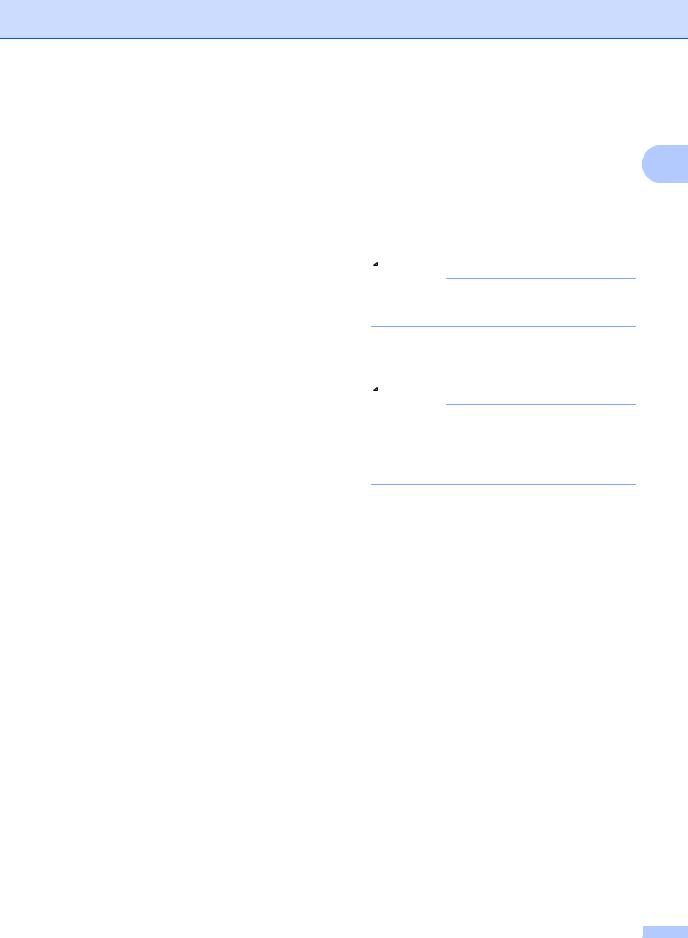
e Double-click top.pdf. If the country screen appears, choose your country.
f After the list of User’s Guides appears, choose the Guide you want to read.
How to find Scanning instructions
There are several ways you can scan documents. You can find the instructions as follows:
Software User's Guide
Scanning
ControlCenter
Network Scanning (for DCP-8110DN and DCP-8155DN)
General information |
|
Nuance™ PaperPort™ 12SE |
|
How-to-Guides |
|
(for DCP-8110DN and DCP-8155DN) |
1 |
(Windows® users) |
The complete Nuance™ PaperPort™ 12SE How-to- Guides can be viewed from the Help section in the Nuance™ PaperPort™ 12SE application.
 Note
Note
Not available to countries subject to applicable export regulations.
Presto! PageManager User’s Guide (Macintosh users)
 Note
Note
Presto! PageManager must be downloaded and installed before use. For further instructions, see Accessing Brother Support (Macintosh) uu page 5.
The complete Presto! PageManager User’s Guide can be viewed from the Help section in the Presto! PageManager application.
How to find Network setup instructions
(for DCP-8110DN and DCP-8155DN)
Your machine can be connected to a wired network.
Basic setup instructions uu Quick Setup Guide
For more information about network setup uu Network User's Guide
3
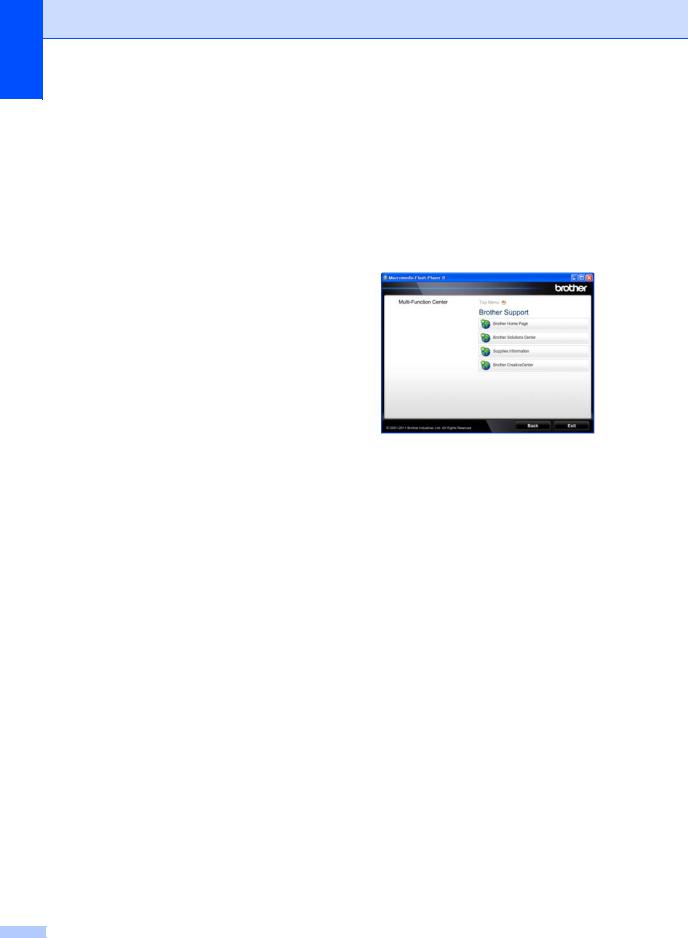
Chapter 1
How to access the
User's Guides for
Advanced Features
You can view and download these Guides from the Brother Solutions Center at:
http://solutions.brother.com/
Google Cloud Print Guide
(for DCP-8110DN and DCP-8155DN)
This Guide provides details on how to configure your Brother machine to a Google account and use Google Cloud Print services for printing over the Internet from devices using Gmail™ for mobile, GOOGLE DOCS™ for mobile and applications for the Chrome OS.
Mobile Print/Scan Guide for Brother iPrint&Scan
(for DCP-8110DN and DCP-8155DN)
This Guide provides useful information about
printing JPEG and PDF 1 files from your mobile device and scanning from your Brother machine to your mobile device when connected on a Wi-Fi network.
1 PDF printing is not supported on Windows® Phone.
4
Accessing Brother
Support (Windows®)
You can find all the links you will need, such as Web support (Brother Solutions Center) on the Installer CD-ROM.
Click Brother Support on the main menu. The following screen will appear:
To access our website (http://www.brother.com/), click Brother Home Page.
For the latest news and product support information (http://solutions.brother.com/), click
Brother Solutions Center.
To visit our website for original Brother Supplies (http://www.brother.com/original/), click
Supplies Information.
To access the Brother CreativeCenter (http://www.brother.com/creativecenter/) for FREE photo projects and printable downloads, click Brother CreativeCenter.
To return to the main page, click Back or if you have finished, click Exit.
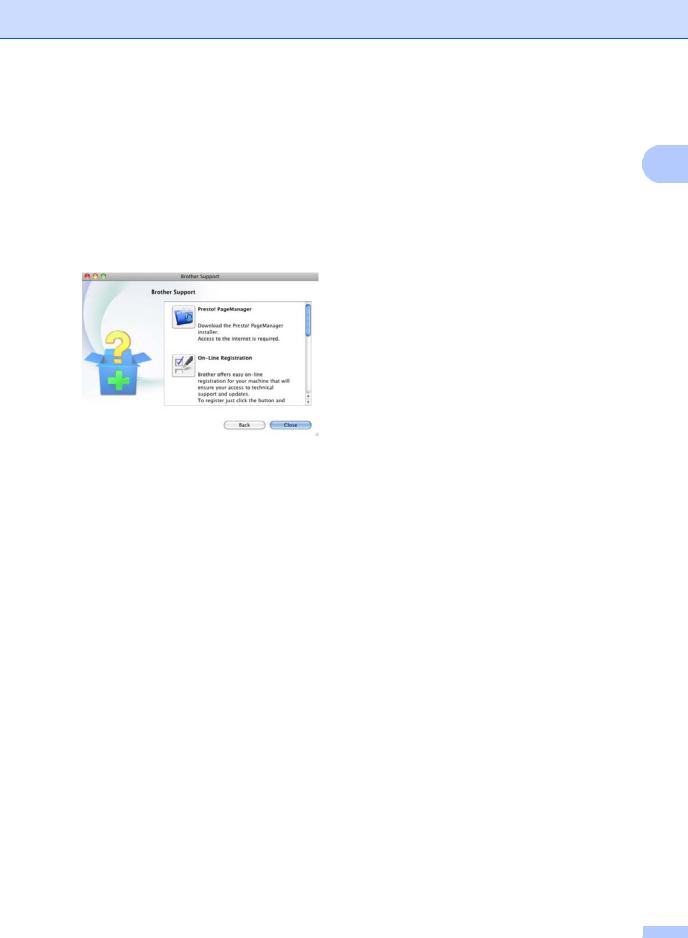
Accessing Brother
Support (Macintosh)
You can find all the links you will need, such as Web support (Brother Solutions Center) on the Installer CD-ROM.
Double-click the Brother Support icon. The following screen will appear:
To download and install Presto! PageManager, click Presto! PageManager.
To register your machine using the Brother Product Registration Page (http://www.brother.com/registration/), click On-Line Registration.
For the latest news and product support information (http://solutions.brother.com/), click
Brother Solutions Center.
To visit our website for original Brother Supplies (http://www.brother.com/original/), click
Supplies Information.
General information
1
5
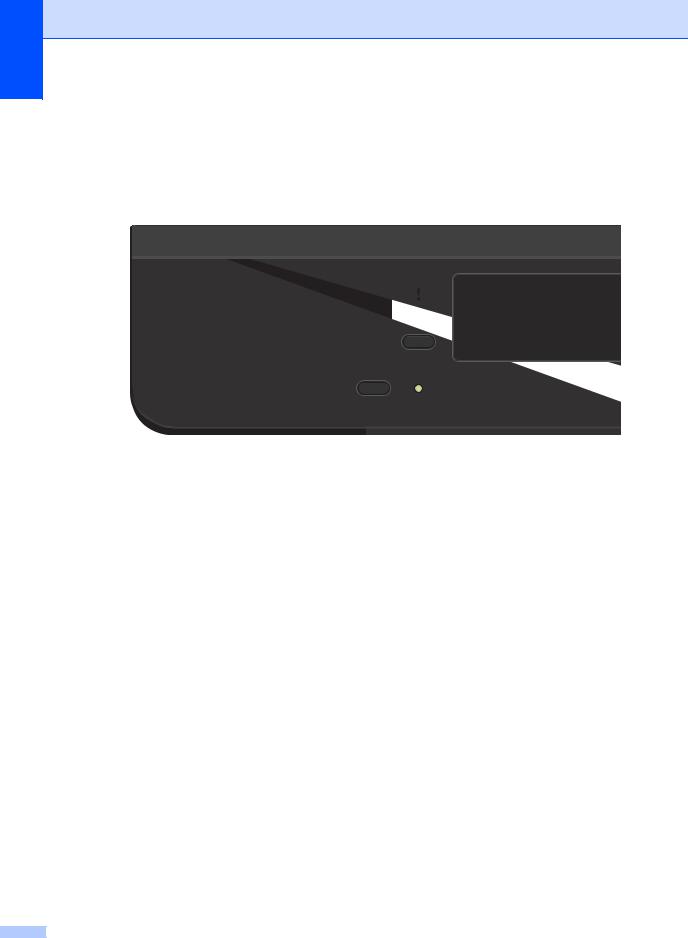
Chapter 1
Control panel overview
DCP-8110D, DCP-8110DN and DCP-8155DN have the same keys. The illustration is based on the DCP-8155DN.
1 |
2 |
3 |
4 |
|
|
|
Contrast:- |
|
|
|
|
|
|
|
|
|
+ |
|
|
|
|
|
|
|
|
|
|
|
|
|
|
|
|||
|
|
|
|
|
|
|
|
|
|
|
|
|
|||
|
|
|
|
|
|
|
|
||||||||
|
|
|
Quality |
:Auto |
|
|
|
||||||||
|
|
|
Enlg/Red:100% |
|
|
|
|||||||||
|
|
|
Tray |
:MP>T1 |
|
|
01 |
||||||||
|
|
|
|
||||||||||||
|
|
|
Pressab or Start |
||||||||||||
|
|
||||||||||||||
|
|
|
|
|
|
|
|
|
|
|
|
|
|
|
|
|
|
|
|
|
|
|
|
|
|
|
|
|
|
|
|
|
|
|
|
|
|
|
|
|
|
|
|
|
|
|
|
|
|
|
|
|
|
|
|
|
|
|
|
|
|
|
|
1COPY keys: Options
You can quickly and easily choose temporary settings for copying.
Enlarge/Reduce
Enlarges or reduces copies.
11 |
10 |
9 |
2Error LED
Blinks in orange when the LCD displays an error or an important status message.
3Duplex
You can choose Duplex to copy or print on both sides of the paper.
4LCD
Displays messages to help you set up and use your machine.
6
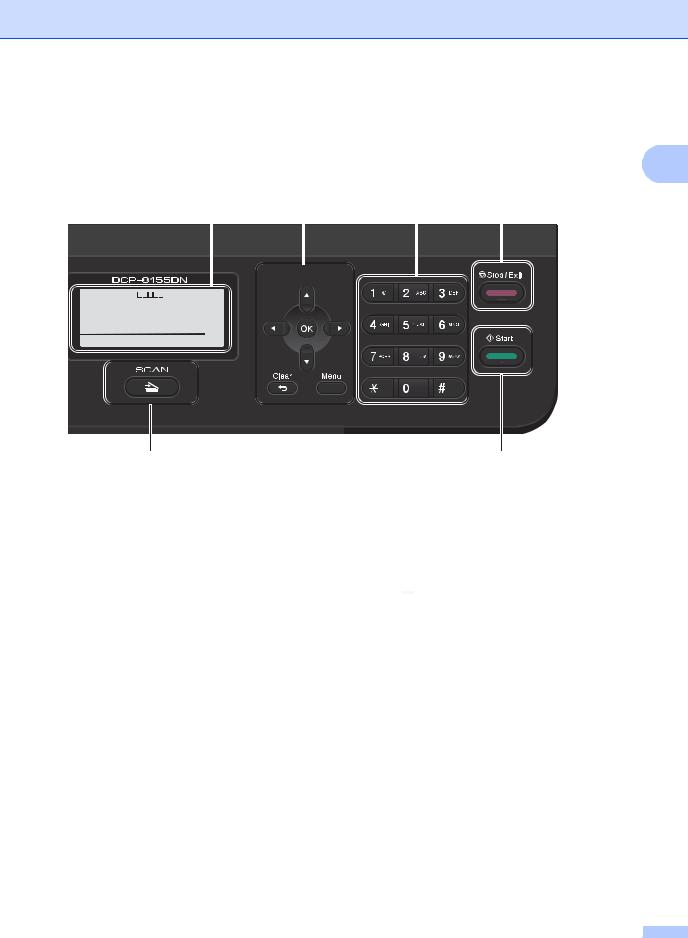
General information
1
4 |
5 |
6 |
7 |
Contrast:- |
|
|
|
|
|
|
|
|
|
+ |
|
|
|
|
|
|
|
|
|
|
|
|
|
|
|
|
|
|
|
|
|
|
|
|
|
|
|||
|
|
|
|
|
|
|
|
|
|
|
|
|
|
|
|
|
|||
|
|
|
|
|
|
|
|
|
|
|
|
|
|
|
|
|
|||
|
|
|
|
|
|
|
|
|
|
|
|
|
|||||||
|
|
|
|
|
|
|
|
|
|
|
|
|
|
|
|
|
|||
Quality |
:Auto |
|
|
|
|
|
|
|
|
|
|
||||||||
Enlg/Red:100% |
|
|
|
|
|
|
|
|
|
|
|||||||||
|
|
|
|
|
|
|
|
|
|
||||||||||
Tray |
:MP>T1 |
|
|
01 |
|
|
|
|
|
|
|
||||||||
Pressab or Start |
|
|
|
|
|
|
|
||||||||||||
|
|
|
|
|
|
|
|
|
|
|
|
|
|
|
|
|
|
|
|
|
|
|
|
|
|
|
|
|
|
|
|
|
|
|
|
|
|
|
|
|
|
|
|
|
|
|
|
|
|
|
|
|
|
|
|
|
|
|
|
|
|
|
|
|
|
|
|
|
|
|
|
|
|
|
|
|
|
|
|
|
|
|
|
|
|
|
|
|
|
|
|
|
|
|
|
|
|
|
|
|
|
|
|
|
|
|
|
|
|
|
|
|
|
|
|
|
|
|
|
9
5Menu keys: Clear
Deletes entered data or lets you cancel the current setting.
Menu
Lets you access the Menu to program your settings or retrieve information from the machine.
OK
Lets you store your settings and confirm LCD messages.
Selection keys: d or c
Press to scroll backwards or forwards through menu selections.
a or b
Press to scroll through the menus and options.
6Numeric keys
Use these keys to enter text.
8
7Stop/Exit
Stops an operation or exits from a menu.
8Start
Lets you start making copies.
9SCAN:
 SCAN
SCAN
Puts the machine in SCAN mode.
10Data LED
The LED will flash depending on the machine's status.
11Secure Print
You can print data saved in the memory when you enter your four-digit password.
(uu Software User's Guide)
When using Secure Function Lock, you can switch restricted users by holding down d as you press Secure Print. (uu Advanced User's Guide: Secure Function Lock 2.0)
7
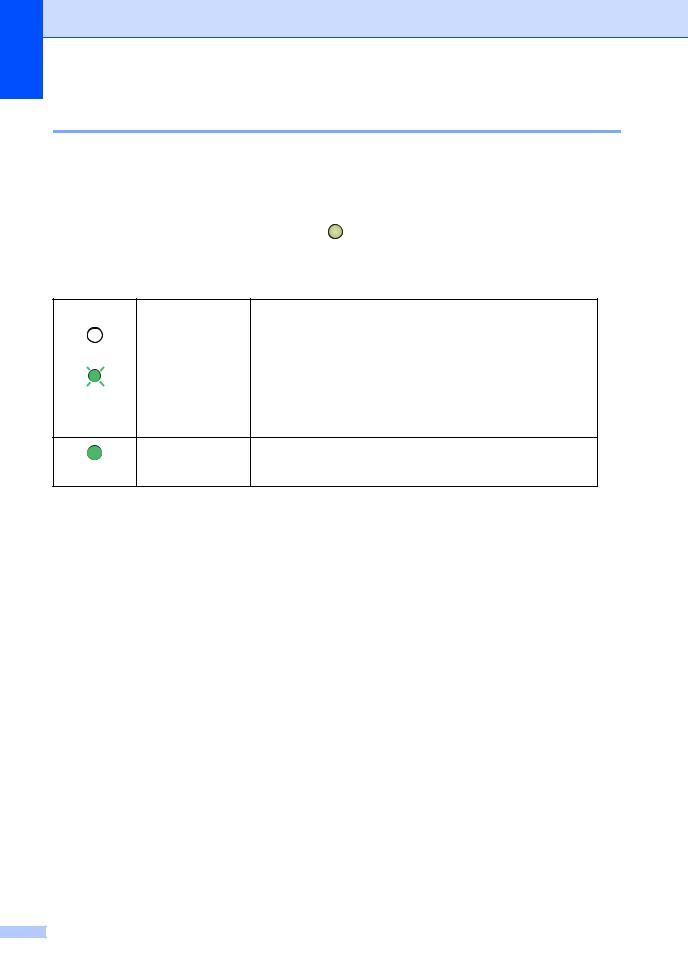
Chapter 1
Data LED indications
The Data LED (light emitting diode) will flash depending on the machine’s status.
|
|
|
|
|
|
|
LED |
Machine's Status |
Description |
||||
|
|
|
|
|
|
|
|
|
|
Ready Mode |
The machine is ready to print, in Sleep mode, there is no print |
||
|
|
|
|
data, or the power switch is off. |
||
|
|
|
|
|
|
|
|
|
|
Receiving Data |
The machine is either receiving data from the computer, |
||
|
|
|
||||
|
|
|
|
processing data in memory, or printing data. |
||
|
|
|
|
|||
|
|
|
|
|
|
|
Green (blinking)
Data Remaining in Print data remains in the machine's memory.
Memory
Green
8
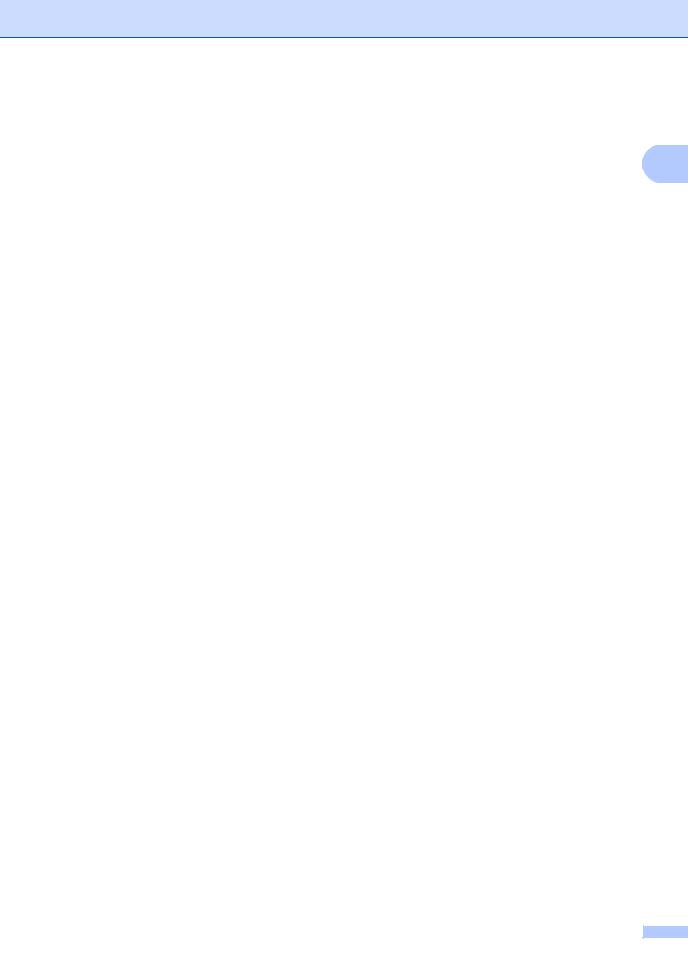
General information
Volume settings
Beeper volume |
1 |
When the beeper is on, the machine will beep when you press a key or make a mistake. You can choose a range of volume levels.
a Press Menu, 1, 2.
b Press a or b to choose Low, Med, High or Off.
Press OK.
c Press Stop/Exit.
9
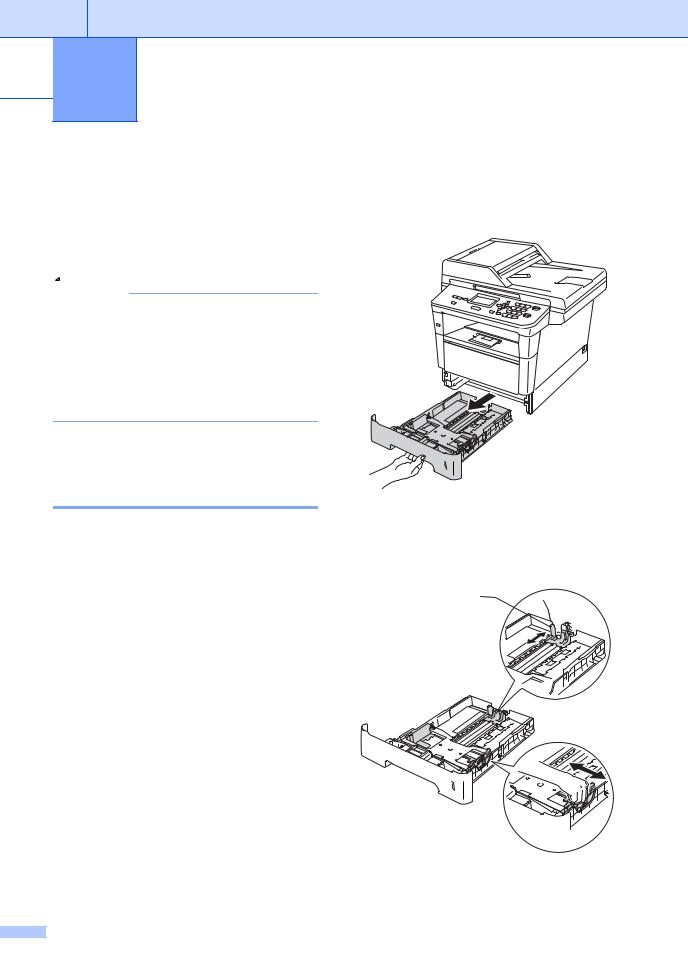
 2 Loading paper
2 Loading paper
Loading paper and print media
The machine can feed paper from the standard paper tray, optional lower tray or multi-purpose tray.
 Note
Note
If your application software supports paper size selection in the print menu, you can select it through the software. If your application software does not support it, you can set the paper size in the printer driver or by using the control panel buttons.
Loading paper in the standard paper tray and the optional lower tray
You can load up to 250 sheets in the standard paper tray (Tray 1) and 500 sheets in the optional lower tray (Tray 2). Paper can be loaded up to the maximum paper mark
(

 ) on the right-hand side of the paper tray. (For recommended paper to use, see
) on the right-hand side of the paper tray. (For recommended paper to use, see
Acceptable paper and other print media uu page 19.)
10
Printing on plain paper, thin paper or recycled paper from Tray 1 and Tray 2
a Pull the paper tray completely out of the machine.
b While pressing the green paper-guide release lever (1), slide the paper guides to fit the paper you are loading in the tray. Make sure that the guides are firmly in the slots.
1

1

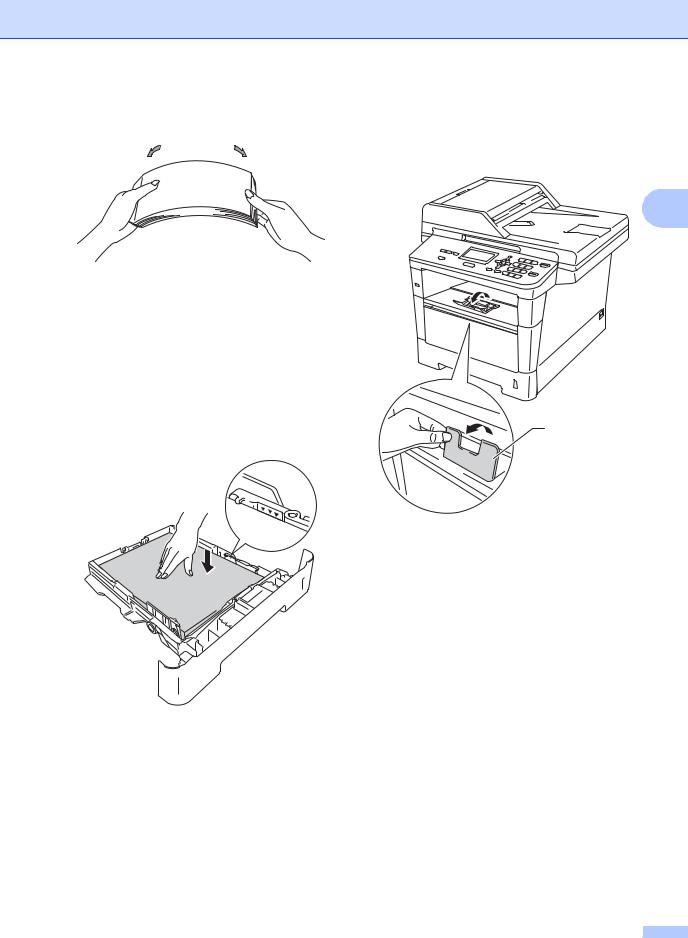
c Fan the stack of paper well to avoid paper jams and misfeeds.
d Put paper in the tray and make sure:
The paper is below the maximum paper mark (

 ) (1).
) (1).
Overfilling the paper tray will cause paper jams.
The side to be printed on must be face down.
The paper guides touch the sides of the paper so it will feed correctly.
1
e Put the paper tray firmly back in the machine. Make sure that it is completely inserted into the machine.
Loading paper
f Lift up the support flap (1) to prevent paper from sliding off the face-down output tray, or remove each page as soon as it comes out of the machine.
2
1
11
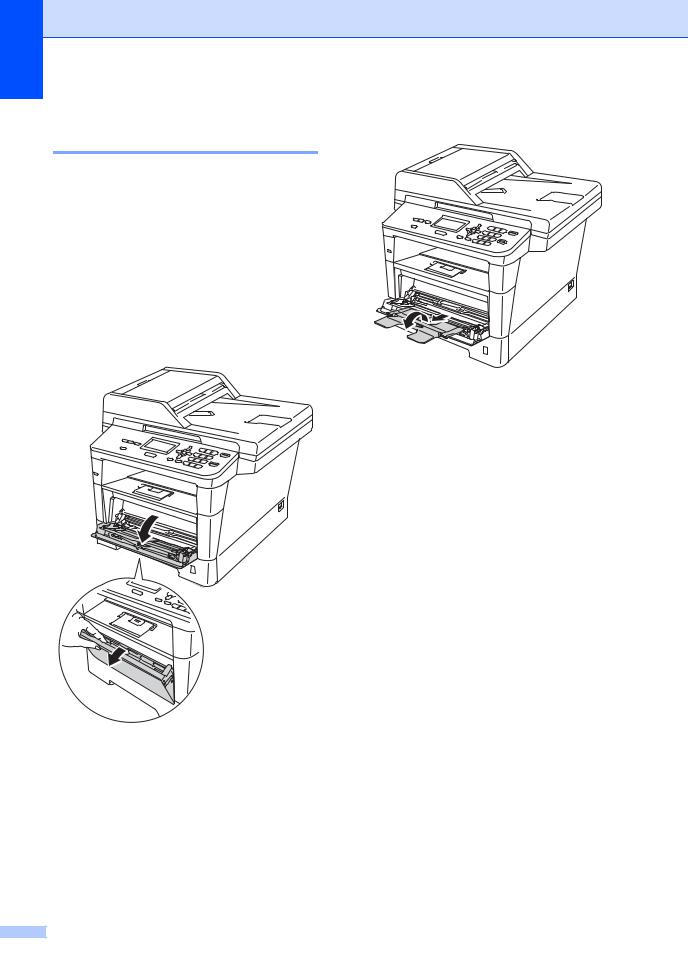
Chapter 2
Loading paper in the multi-purpose tray (MP tray)
You can load up to 3 envelopes or special print media in the MP tray or up to 50 sheets of plain paper. Use this tray to print or copy on thick paper, bond paper, labels or envelopes. (For recommended paper to use, see Paper capacity of the paper trays uu page 20.)
Printing on plain paper, thin paper, recycled paper and bond paper from the MP tray
a Open the MP tray and lower it gently.
12
b Pull out the MP tray support (1) and unfold the flap (2).
2 1
1
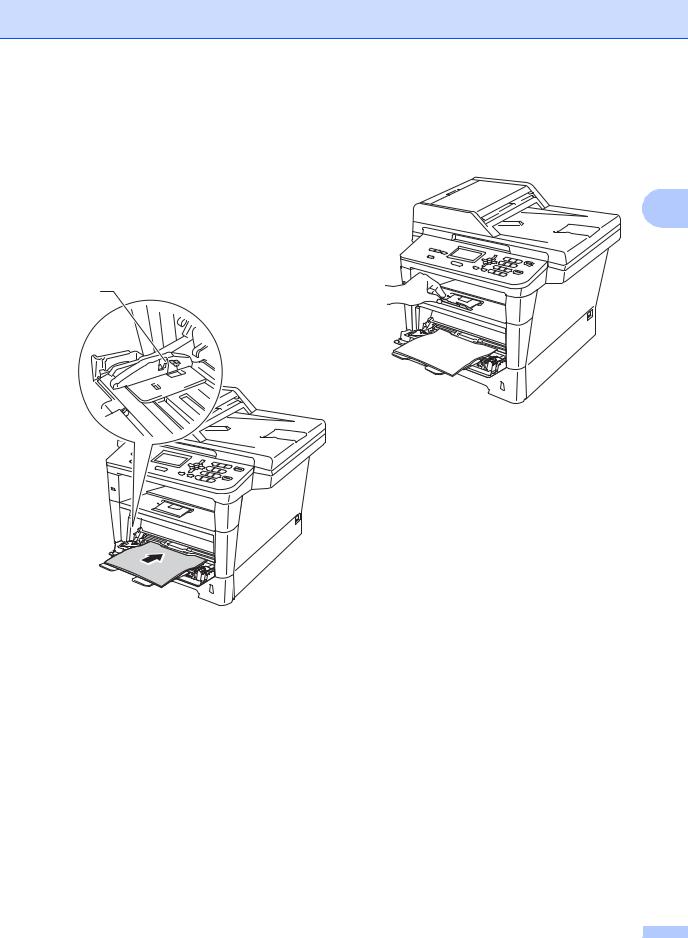
c Put paper in the MP tray and make sure:
The paper stays under the maximum paper mark (1).
The side to be printed on must be face up with the leading edge (top of the paper) in first.
The paper guides must gently touch the sides of the paper so it will feed correctly.
1
Loading paper
d Lift up the support flap to prevent paper from sliding off the face-down output tray, or remove each page as soon as it comes out of the machine.
2
13
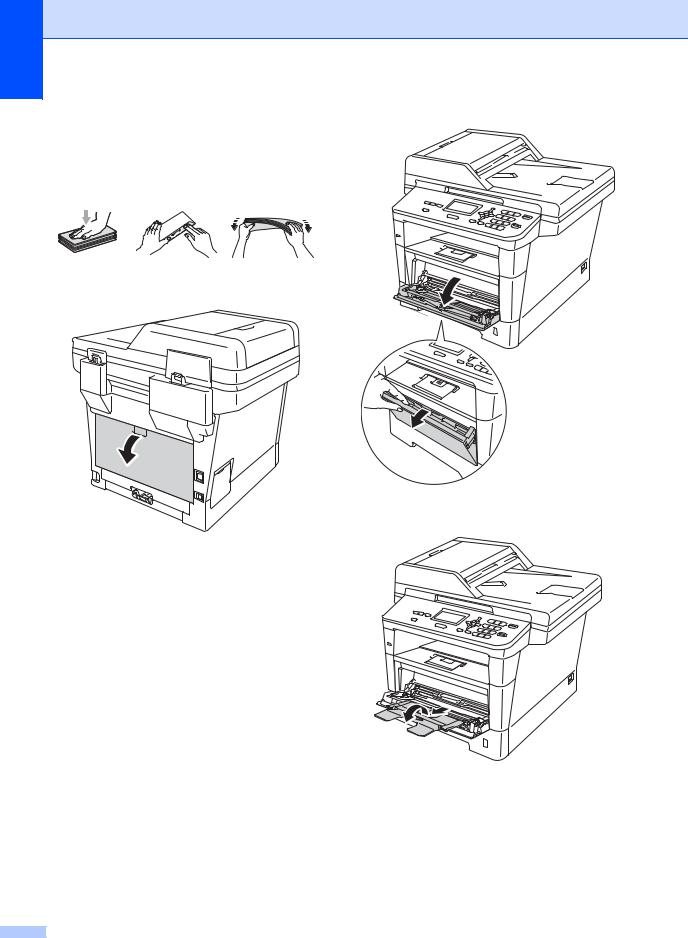
Chapter 2
Printing on thick paper, labels and envelopes from the MP tray
Before loading, press the corners and sides of the envelopes to make them as flat as possible.
a Open the back cover (face-up output tray).
b Open the MP tray and lower it gently.
c Pull out the MP tray support (1) and unfold the flap (2).
2 1
1
14
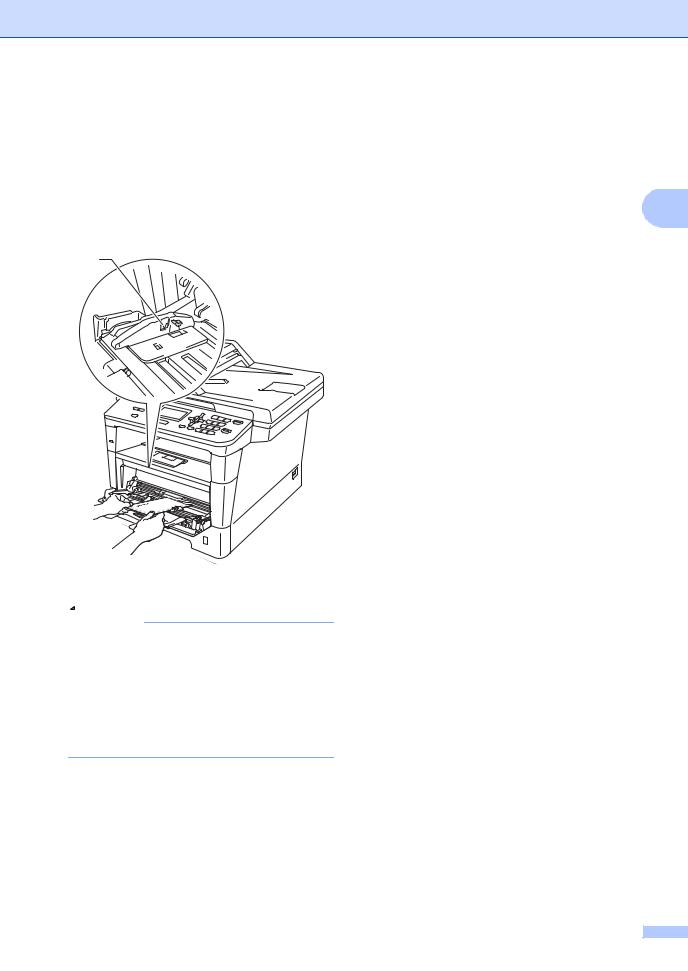
d Put paper, labels or envelopes in the MP tray. Make sure:
The number of envelopes in the MP tray does not exceed 3.
The paper, labels or envelopes stay under the maximum paper mark (1).
The side to be printed on is face up.
1
e Send the print data to the machine.
 Note
Note
•Remove each printed envelope immediately to prevent a paper jam.
•If your thick paper curls during printing, put only one sheet at a time in the MP tray and open the back cover (face-up output tray) to let the printed pages exit to the face-up output tray.
f Close the back cover (face-up output tray).
Loading paper
2
15
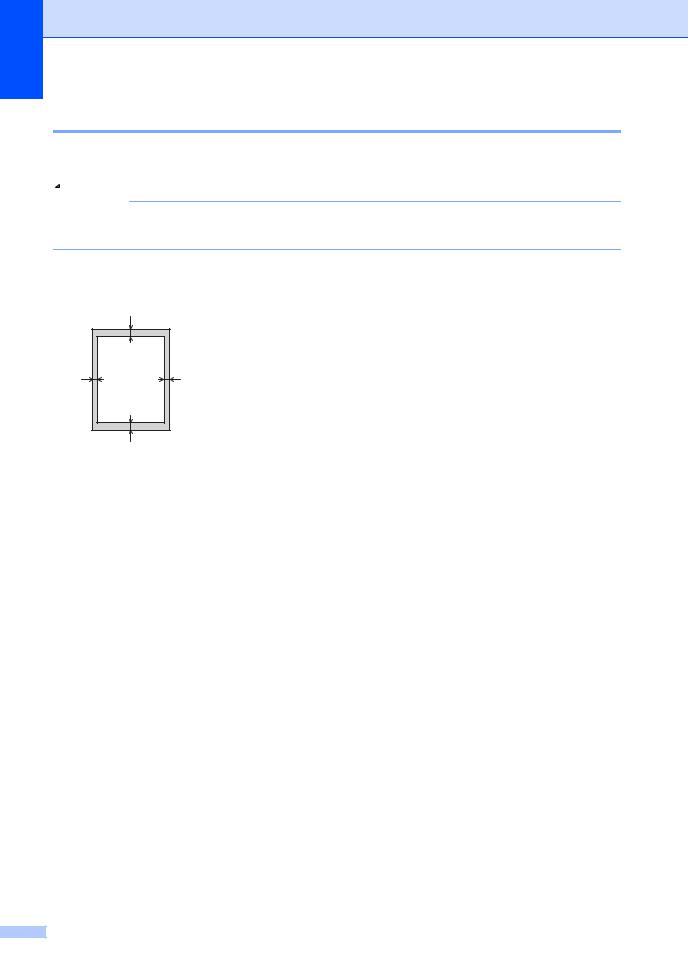
Chapter 2
Unscannable and unprintable areas
The figures below show maximum unscannable and unprintable areas. These areas may vary depending on the paper size or settings in the application you are using.
 Note
Note
When using BR-Script3 emulation, the unprintable area around the edges of the paper is 4.2 mm.
|
1 |
2 |
4 |
|
3 |
Usage |
Document |
Top (1) |
Left (2) |
|
Size |
Bottom (3) |
Right (4) |
|
|
||
|
|
|
|
Copy* |
Letter |
4 mm |
4 mm |
|
|
|
|
*a single copy |
A4 |
4 mm |
3 mm |
or a 1 in 1 copy |
|
|
|
|
|
|
|
|
Legal |
4 mm |
4 mm |
|
|
|
|
Scan |
Letter |
3 mm |
3 mm |
|
|
|
|
|
A4 |
3 mm |
3 mm |
|
|
|
|
|
Legal |
3 mm |
3 mm |
|
|
|
|
Letter |
4.2 mm |
6.35 mm |
|
|
|
|
|
|
A4 |
4.2 mm |
6.01 mm |
|
|
|
|
|
Legal |
4.2 mm |
6.35 mm |
|
|
|
|
16
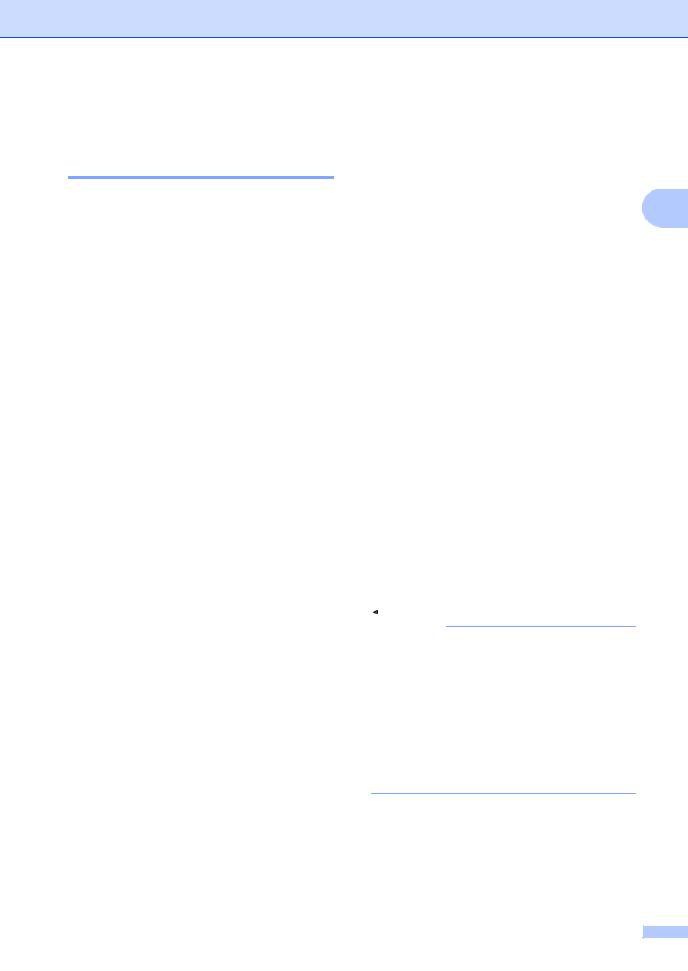
Paper settings
Paper Type
Set up the machine for the type of paper you are using. This will give you the best print quality.
a Do one of the following:
To set the paper type for the
MP Tray press Menu, 1, 1, 1, 1.
To set the paper type for Tray#1 press Menu, 1, 1, 1, 2.
To set the paper type for Tray#2 1 press Menu, 1, 1, 1, 3.
b Press a or b to choose Thin, Plain,
Thick, Thicker, Recycled Paper or Label 2.
Press OK.
c Press Stop/Exit.
1Tray#2 appears only if the optional lower tray is installed.
2The Label type option appears only if you chose the MP tray in step a.
Loading paper
Paper Size |
|
|
You can use the following sizes of paper. |
|
|
For Copies: |
|
|
A4, Letter, Legal, Executive, A5, A5 L, A6, |
|
|
B5, B6 and Folio |
2 |
|
When you change the size of paper in the |
||
|
||
tray, you will also need to change the Paper |
|
|
Size setting so your machine can fit the |
|
|
document on the page. |
|
a Do one of the following:
To set the paper size for the
MP Tray press Menu, 1, 1, 2, 1.
To set the paper size for Tray#1 press Menu, 1, 1, 2, 2.
To set the paper size for Tray#2 1 press Menu, 1, 1, 2, 3.
b Press a or b to choose A4, Letter,
Legal, Executive, A5, A5 L, A6, B5,
B6, Folio or Any 2. Press OK.
c Press Stop/Exit.
1Tray#2 appears only if the optional lower tray is installed.
2The Any option appears only when you choose the MP tray.
 Note
Note
•If you choose Any for the MP Tray Paper Size, you must choose MP Only for the Tray Use setting. You cannot use the Any Paper Size option for the MP tray when making N in 1 copies. You must choose one of the other available Paper Size options for the MP tray.
•A5 L and A6 size are not available for
Tray#2.
17
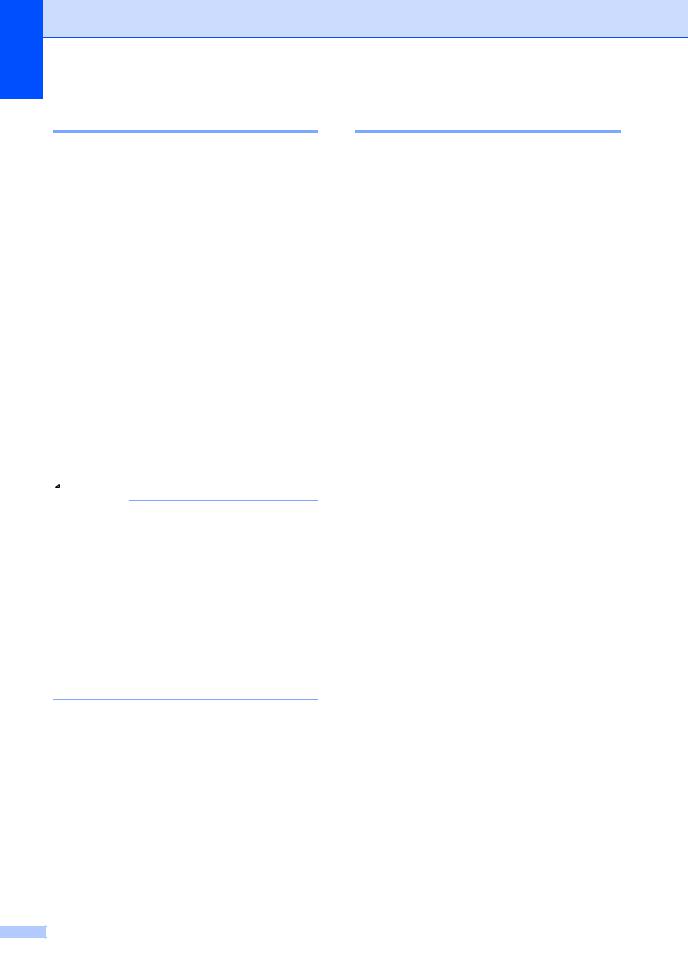
Chapter 2
Tray Use in COPY mode
You can change the priority tray that the machine will use for printing copies.
When you choose Tray#1 Only, MP Only
or Tray#2 Only 1, the machine pulls the paper only from that tray. If the selected tray is out of paper, No Paper will appear on the LCD. Insert paper in the empty tray.
To change the tray setting follow the instructions below:
a Press Menu, 1, 5, 1.
b Press a or b to choose Tray#1 Only,
Tray#2 Only 1, MP Only,
MP>T1>T2 1 or T1>T2 1>MP. Press OK.
1Tray#2 Only and T2 appear only if the optional lower tray is installed.
c Press Stop/Exit.
 Note
Note
•When loading documents in the ADF and
MP>T1>T2 or T1>T2>MP is selected, the machine looks for the tray with the most suitable paper and pulls paper from that tray. If no tray has suitable paper, the machine pulls paper from the higher priority tray.
•When using the scanner glass, your document is copied from the higher priority tray even if more suitable paper is in another paper tray.
18
Tray Use in print mode
You can change the default tray the machine will use for printing from your computer and Direct Print.
a Press Menu, 1, 5, 2.
b Press a or b to choose Tray#1 Only,
Tray#2 Only 1, MP Only,
MP>T1>T2 1 or T1>T2 1>MP. Press OK.
1Tray#2 Only and T2 appear only if the optional lower tray is installed.
c Press Stop/Exit.
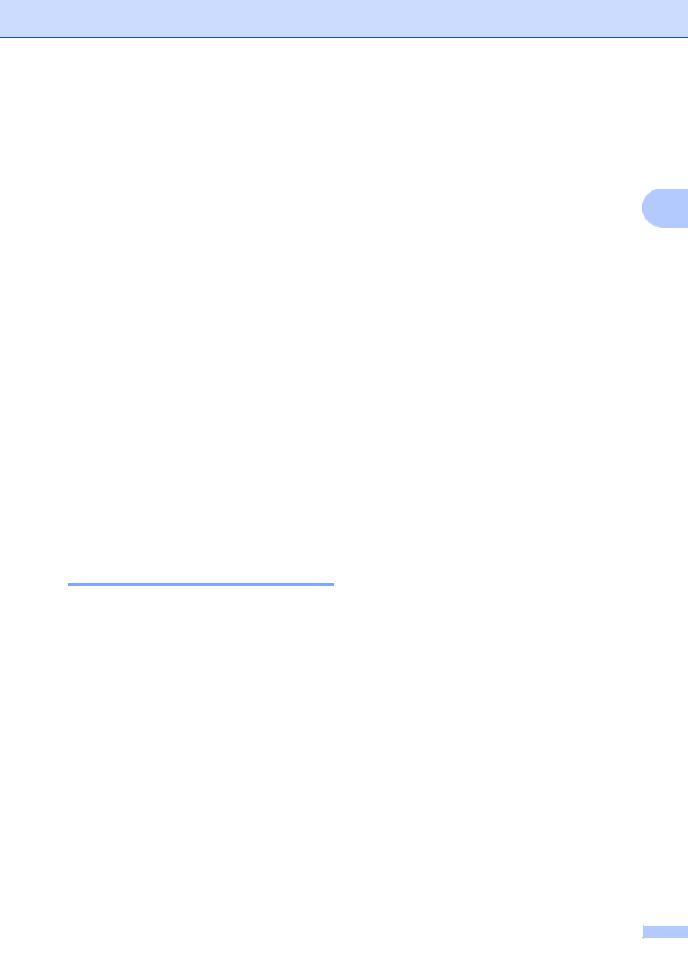
Acceptable paper and other print media
Print quality may vary according to the type of paper you are using.
You can use the following types of print media: plain paper, thin paper, thick paper, thicker paper, bond paper, recycled paper, labels or envelopes.
For best results, follow the instructions below:
DO NOT put different types of paper in the paper tray at the same time because it may cause paper jams or misfeeds.
For correct printing, you must choose the same paper size from your software application as the paper in the tray.
Avoid touching the printed surface of the paper immediately after printing.
Before you buy a lot of paper, test a small quantity to make sure the paper is suitable.
Use labels that are designed for use in laser machines.
Type and size of paper
The machine feeds paper from the installed standard paper tray, multi-purpose tray or optional lower tray.
The names for the paper trays in the printer driver and this Guide are as follows:
Tray and optional unit |
Name |
Standard Paper Tray |
Tray 1 |
|
|
Multi-purpose Tray |
MP Tray |
|
|
Optional Lower Tray |
Tray 2 |
|
|
Loading paper
2
19
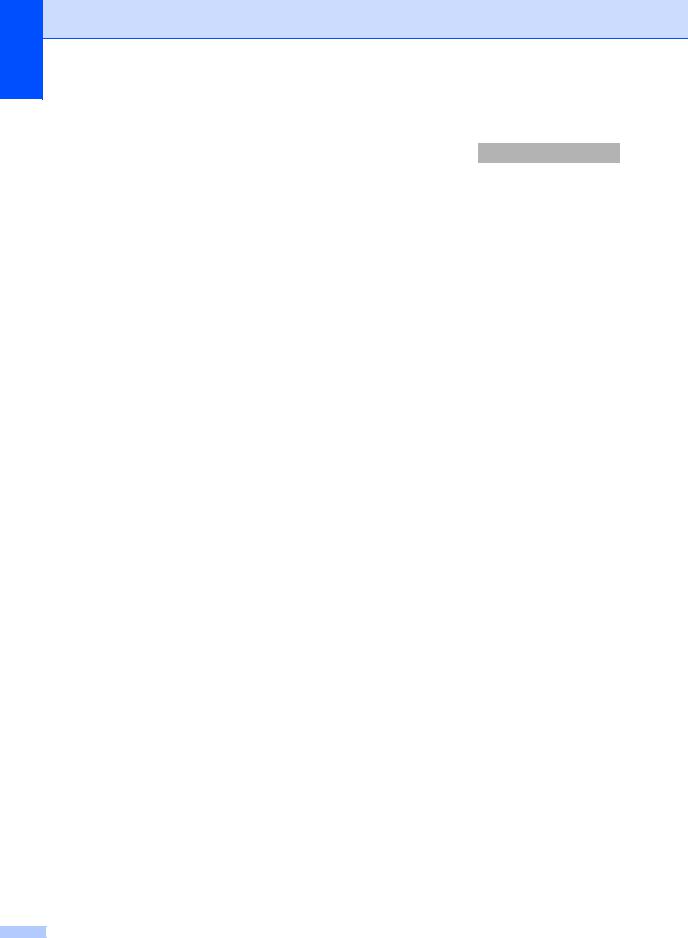
Chapter 2
Paper capacity of the paper trays
|
Paper size |
Paper types |
No. of sheets |
Standard Paper Tray |
A4, Letter, Legal 1, B5, |
Plain paper, Thin paper, |
up to 250 |
(Tray 1) |
Executive, A5, |
Recycled paper |
(80 gsm) |
|
A5 (Long Edge), A6, B6, |
|
|
|
Folio 1 2 |
|
|
Multi-purpose Tray |
Width: 76.2 to 215.9 mm |
Plain paper, Thin paper, |
50 sheets (80 gsm) |
(MP Tray) |
Length: 127.0 to 355.6 |
Thick paper, |
3 Envelopes |
|
Thicker paper, |
||
|
mm |
|
|
|
Bond paper, |
|
|
|
|
|
|
|
|
Recycled paper, |
|
|
|
Envelopes, Labels |
|
|
|
|
|
Optional Lower Tray |
A4, Letter, Legal 1, B5, |
Plain paper, Thin paper, |
up to 500 |
(Tray 2) |
Executive, A5, B6, |
Recycled paper |
(80 gsm) |
|
Folio 1 2 |
|
|
1Legal or Folio size paper are not available in some regions.
2Folio size is 8.5 in. × 13 in.
Recommended paper specifications
The following paper specifications are suitable for this machine.
Basis weight |
75-90 gsm |
|
|
Thickness |
80-110 μm |
|
|
Roughness |
Higher than 20 sec. |
|
|
Stiffness |
90-150 cm3/100 |
Grain direction |
Long grain |
|
|
Volume resistivity |
10e9-10e11 ohm |
Surface resistivity |
10e9-10e12 ohm-cm |
Filler |
CaCO3 (Neutral) |
Ash content |
Below 23 wt% |
|
|
Brightness |
Higher than 80% |
|
|
Opacity |
Higher than 85% |
|
|
Use paper made for plain paper copying.
Use paper that is 75 to 90 gsm.
Use long grain paper with a neutral Ph value, and a moisture content of approx. 5%.
This machine can use recycled paper that meets DIN 19309 specifications.
20
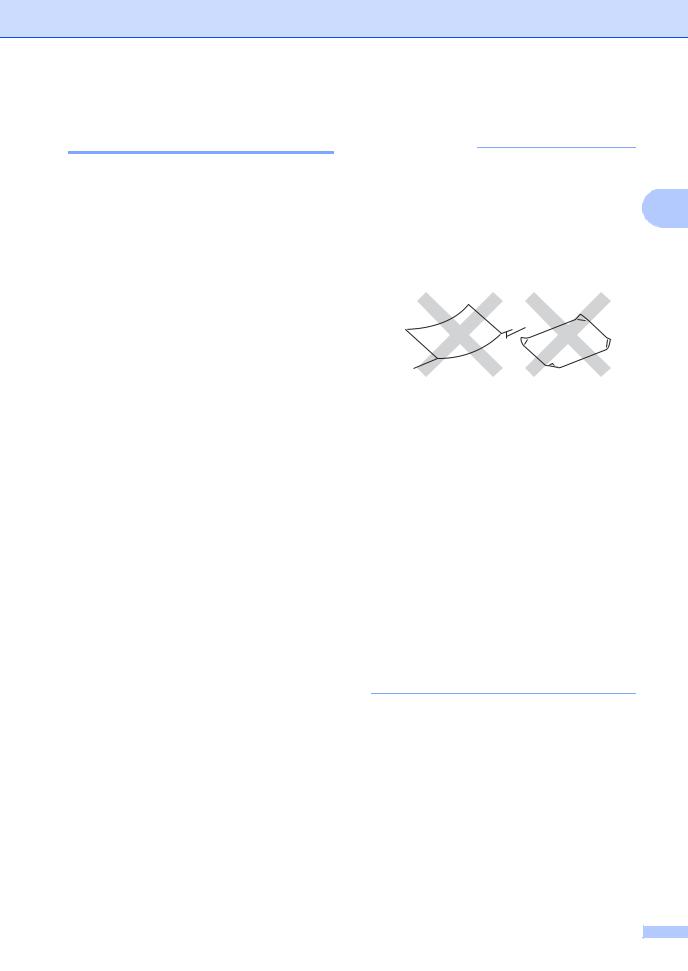
Handling and using special paper
The machine is designed to work well with most types of xerographic and bond paper. However, some paper variables may have an effect on print quality or handling reliability. Always test samples of paper before purchasing to ensure desirable performance. Store paper in its original packaging and keep it sealed. Keep the paper flat and away from moisture, direct sunlight and heat.
Some important guidelines when selecting paper are:
DO NOT use inkjet paper because it may cause a paper jam or damage your machine.
Preprinted paper must use ink that can withstand the temperature of the machine’s fusing process 200 °C.
If you use bond paper, paper with a rough surface, or paper that is wrinkled or creased, the paper may exhibit degraded performance.
Loading paper
Types of paper to avoid
 Important
Important
Some types of paper may not perform well or may cause damage to your machine.
DO NOT use paper: |
2 |
•that is highly textured
•that is extremely smooth or shiny
•that is curled or warped
1
1
1A curl of 2 mm or greater may cause jams to occur.
•that is coated or has a chemical finish
•that is damaged, creased or folded
•that exceeds the recommended weight specification in this guide
•with tabs and staples
•with letterheads using low temperature dyes or thermography
•that is multipart or carbonless
•that is designed for inkjet printing
The types of paper listed above may damage your machine. This damage is not covered under any Brother warranty or service agreement.
21
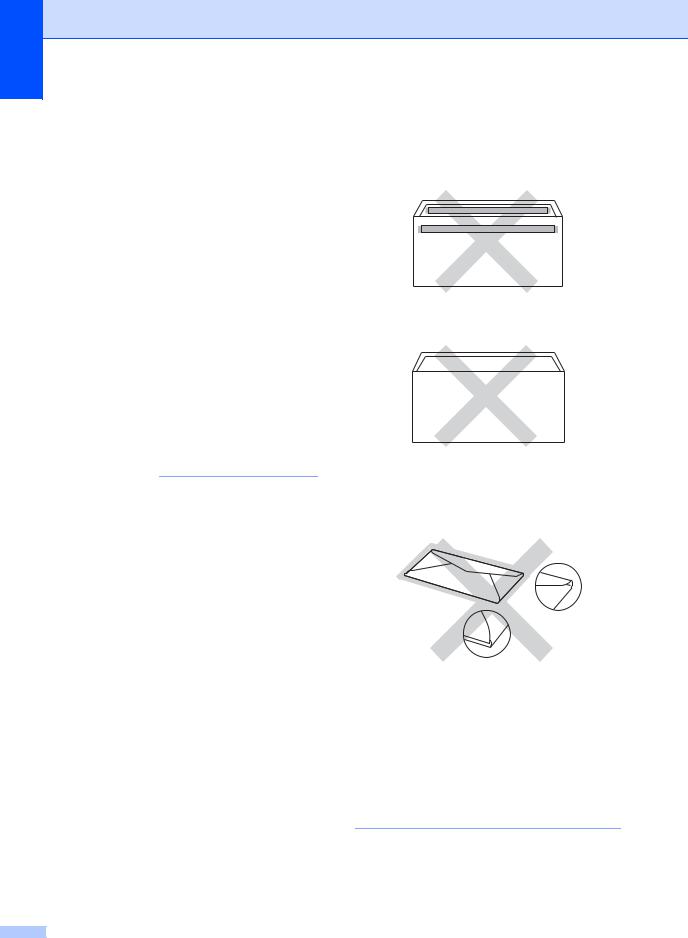
Chapter 2
Envelopes
Most envelopes designed for laser printers will be suitable for your machine. However, some envelopes may have feed and printquality problems because of the way they have been made. A suitable envelope should have edges with straight, well-creased folds. The envelope should lie flat and not be of baggy or flimsy construction. You should buy quality envelopes from a supplier who understands that you will be using the envelopes in a laser machine.
Envelopes can only be fed through the MP tray.
We recommend that you print a test envelope to make sure the print results are what you want before printing a large amount of envelopes.
Types of envelopes to avoid
 Important
Important
DO NOT use envelopes:
•that are damaged, curled, wrinkled or an unusual shape
•that are extremely shiny or textured
•with clasps, staples, snaps or tie strings
•with self-adhesive closures
•that are of a baggy construction
•that are not sharply creased
•that are embossed (have raised writing on them)
•that were previously printed by a laser machine
•that are pre-printed on the inside
•that cannot be arranged neatly when stacked
•that are made of paper that weighs more than the paper weight specifications for the machine
•with edges that are not straight or consistently square
22
•with windows, holes, cut-outs or perforations
•with glue on the surface as shown in the figure below
•with double flaps as shown in the figure below
•with sealing flaps that are not folded down when purchased
•with each side folded as shown in the figure below
If you use any of the types of envelopes listed above, they may damage your machine. This damage may not be covered under any Brother warranty or service agreement.
Occasionally you may experience paper feed problems caused by the thickness, size and flap shape of the envelopes you are using.

Labels
The machine will print on most types of labels designed for use with a laser machine. Labels should have an adhesive that is acrylic-based since this material is more stable at the high temperatures in the fuser unit. Adhesives should not come in contact with any part of the machine. If this happens, the label stock may stick to the drum unit or rollers and cause jams and print quality problems. No adhesive should be exposed between the labels. Labels should be arranged so that they cover the entire length and width of the sheet. Using labels with spaces may result in labels peeling off and causing serious jams or print problems.
All labels used in this machine must be able to withstand a temperature of 200 °C for a period of 0.1 seconds.
Labels can only be fed through the MP tray.
Loading paper
Types of labels to avoid
Do not use labels that are damaged, curled, wrinkled or an unusual shape.
2
 Important
Important
•DO NOT feed part used label sheets. The exposed carrier sheet will damage your machine.
•Label sheets should not exceed the paper weight specifications described in this User’s Guide. Labels exceeding this specification may not feed or print correctly and may cause damage to your machine.
•DO NOT reuse or insert labels that have previously been used or are missing a few labels on the sheet.
23

 3 Loading documents
3 Loading documents
How to load documents
You can copy and scan from the ADF (automatic document feeder) or the scanner glass.
Using the automatic document feeder (ADF)
The ADF can hold up to 35 pages (for DCP-8110D and DCP-8110DN) or up to 50 pages (for DCP-8155DN) and feeds each sheet individually. We recommend you use standard 80 gsm paper and always fan the pages before putting them in the ADF.
Document Sizes Supported
Length: |
147.3 to 355.6 mm |
Width: |
147.3 to 215.9 mm |
Weight: |
64 to 90 gsm |
|
|
How to load documents
 Important
Important
•DO NOT leave thick documents on the scanner glass. If you do this, the ADF may jam.
•DO NOT use paper that is curled, wrinkled, folded, ripped, stapled, paperclipped, pasted or taped.
•DO NOT use cardboard, newspaper or fabric.
•To avoid damaging your machine while using the ADF, DO NOT pull on the document while it is feeding.
 Note
Note
•To scan documents that are not suitable for the ADF, see Using the scanner glass uu page 25.
•It is easier to use the ADF if you are loading a multiple page document.
•Make sure documents with correction fluid or written with ink are completely dry.
a Unfold the ADF document support (1). Lift up and unfold the ADF document output support flap (2).
1 2
b Fan the pages well.
c Stagger the pages of your document face up top edge first, in the ADF until the LCD display message changes and you feel the top page touch the feed rollers.
24

d Adjust the paper guides (1) to fit the width of your document.
1

 Note
Note
To scan non-standard documents, see
Using the scanner glass uu page 25.
Using the scanner glass
You can use the scanner glass to copy or scan pages of a book, one page at a time.
Document Sizes Supported
Length: (DCP-8155DN) Up to 355.6 mm
(DCP-8110D and DCP-8110DN) Up to 300.0 mm
Width: Up to 215.9 mm Weight: Up to 2.0 kg
Loading documents
How to load documents
 Note
Note
To use the scanner glass, the ADF must be empty.
a Lift the document cover. |
|
b Using the document guidelines on the |
3 |
left and top, place the document
face down in the upper left corner of the scanner glass.
c Close the document cover.
cover.
 Important
Important
If the document is a book or is thick do not slam the cover or press on it.
25

 4 Making copies
4 Making copies
How to copy
The following steps show the basic copy operation.
Contrast:- 





 +
+
Quality :Auto
Enlg/Red:100%
Tray |
:MP>T1 |
01 |
|
1 |
Pressab or Start |
|
|||
|
||||
1 No. of Copies
Use the numeric pad to enter the number of copies you want.
a Do one of the following to load your document:
Place the document face up in the ADF. (See Using the automatic document feeder (ADF)
uu page 24.)
Load your document face down on the scanner glass. (See Using the scanner glass uu page 25.)
b Press Start.
Stop copying
To stop copying, press Stop/Exit.
Copy settings
Press temporary COPY keys or Duplex and then press a, b, d or c to scroll through the copy settings. When the setting you want is highlighted, press OK.
(Basic User's Guide)
For details about changing the following settings uu page 17 - 18:
Paper Type
Paper Size
Tray Use (Tray Use in COPY mode)
26
(Advanced User's Guide)
For details about changing the following settings uu Advanced User's Guide: Copy settings:
Enlg/Red (Enlarge/Reduce)
Stack/Sort
Quality
Brightness
Contrast
Page Layout
Tray Select (Tray Selection)
Duplex

|
|
|
|
|
|
5 |
Printing data from a USB Flash |
|
|
memory drive or digital camera |
|
|
|
|
supporting mass storage |
|
|
|
With the Direct Print feature, you do not need a computer to print data. You can print by just plugging your USB Flash memory drive into the machine’s USB direct interface. You can also connect and print directly from a camera set to USB mass storage mode.
You can use a USB Flash Memory Drive that has the following specifications:
USB Class |
USB Mass Storage Class |
|
|
USB Mass Storage |
SCSI or SFF-8070i |
Class |
|
|
|
Transfer protocol |
Bulk transfer Only |
|
|
Format 1 |
FAT12/FAT16/FAT32 |
Sector size |
Max. 4096Byte |
|
|
Encryption |
Encrypted devices are |
|
not supported. |
|
|
1 NTFS format is not supported.
 Note
Note
•Some USB Flash memory drives may not work with the machine.
•If your camera is in PictBridge mode, you cannot print data. Please refer to the documentation supplied with your camera to switch from PictBridge mode to mass storage mode.
b Choose Brother DCP-XXXX Printer (1) and check the Print to file box (2). Click Print.
1
2
5
c Choose the folder you want to save the file to and enter the file name if you are prompted to.
If you are prompted for a file name only, you can also specify the folder you want to save the file in by entering the directory name. For example: C:\Temp\FileName.prn
If you have a USB Flash memory drive or digital camera connected to your computer, you can save the file directly to the USB Flash memory drive.
Creating a PRN file for direct printing
 Note
Note
The screens in this section may vary depending on your application and operating system.
a From the menu bar of an application, click File, then Print.
27

Chapter 5
Printing data directly from the USB Flash memory drive or digital camera supporting mass storage
a Connect your device to the USB direct interface (1) on the front of the machine. Your machine will enter Direct Print mode automatically.
The LCD will automatically show the USB memory menu to confirm the intended use of the device.
1

1
 Note
Note
•Make sure your digital camera is turned on.
•If an error occurs, the USB memory options Direct Print and
Scan to USB will not appear on the LCD.
•When the machine is in the Deep Sleep mode, the LCD does not show any information even if you connect a device to the USB direct interface. Press Stop/Exit on the control panel to wake up the machine.
b Press a or b to choose
1.Direct Print. Press OK.
 Note
Note
•If Direct Print is restricted in Secure Function Lock 2.0 for your User ID, and access has been given to another User ID or Public mode, Access Denied will appear on the LCD. Then the LCD will show Change ID and other User IDs so you may switch to a User ID or Public mode that has access.
If you are a restricted user with access to Direct Print, press a or b to choose your name and press OK. Enter your four-digit password and press OK.
•If your machine has been set to Secure Function Lock On, you may not be able to access Direct Print. (uu Advanced User's Guide: Switching Users)
•If your ID has been restricted to a page limit in Secure Function Lock, the LCD will show Remaining Pages with the number of pages you have left to print.
28

Printing data from a USB Flash memory drive or digital camera supporting mass storage
c Press a or b to choose the folder name or file name you want to print.
Press OK.
If you have chosen the folder name, press a or b to choose the file name you want to print.
Press OK.
Direct Print a1./FOLDER1
2.FILE_1.PDF b3.FILE_2.PDF
Select ab or OK
 Note
Note
•Your digital camera must be switched from PictBridge mode to mass storage mode.
•If you want to print an index of the files, choose Index Print, and then press OK. Press Start to print the data.
d Do one of the following:
Press a or b to choose a setting you need to change and press OK, then press a or b to choose an option for the setting and press OK.
If you do not want to change the current default settings, go to step e.
Print File Set aPaper Size
Media Type bMultiple Page
Select ab or OK
 Note
Note
•You can change the following settings:
Paper Size Media Type Multiple Page Orientation Duplex
Collate |
|
Tray Use |
|
Print Quality |
5 |
PDF Option |
•Depending on the file type, some of these settings may not appear.
e Press Start if you have finished selecting settings.
f Use the numeric keys to enter the number of copies you want. Press OK.
Direct Print
FILE_1.PDF |
1 |
No. of Copies: |
Press Start
g Press Start to print the data. h Press Stop/Exit.
 Important
Important
•To prevent damage to your machine, DO NOT connect any device other than a digital camera or USB Flash memory drive to the USB direct interface.
•DO NOT remove the USB Flash memory drive or digital camera from the USB direct interface until the machine has finished printing.
29

Chapter 5
 Note
Note
•You can change the default tray that the machine will use for printing. Press Menu, 1, 5, 2, and then press a or b to select the tray you want as the new default. Press
OK.
(See Tray Use in print mode uu page 18.)
•You can change the default settings for Direct Print by using the control panel when the machine is not in the Direct Print mode. Press Menu, 4 to enter the
USB Direct I/F menu. (See Menu table uu page 97.)
30

 6 How to print from a computer
6 How to print from a computer
Printing a document
The machine can receive data from your computer and print it. To print from a computer you must install the printer driver.
(uu Software User's Guide: Printing for
Windows® or Printing and Faxing for Macintosh)
a Install the Brother printer driver from the Installer CD-ROM. (uu Quick Setup Guide)
b From your application, choose the Print |
6 |
command. |
|
c Choose the name of your machine in the Print dialog box and click Properties (or Preferences, depending on the application you are using).
d Choose the settings you want in the Properties dialog box, and then click
OK.
Paper Size
Orientation
Copies
Media Type
Resolution
Print Settings
Multiple Page
Duplex / Booklet
Paper Source
e Click OK to begin printing.
31

 7 How to scan to a computer
7 How to scan to a computer
Scanning a document as a PDF file using ControlCenter4 (Windows®)
(Detailed information uu Software User's Guide: Scanning)
 Note
Note
The screens on your PC may vary depending on your model.
ControlCenter4 is a software utility that lets you quickly and easily access the applications you use most often. Using ControlCenter4 eliminates the need to manually launch specific applications.
a b
Load your document. (See How to load documents uu page 24.)
Open ControlCenter4 by clicking Start/All Programs/Brother/XXX-XXXX (where XXX-XXXX is your model name)/ControlCenter4. The ControlCenter4 application will open.
c Choose Home Mode or Advanced Mode before you use ControlCenter4 and then click OK. This section briefly introduces the ControlCenter4 functions in Advanced Mode.
d Make sure the machine you want to use is selected from the Model pull-down list.
32

How to scan to a computer
e Set the scanning configuration.
Click Configuration, then select Button settings, Scan and File.
The configuration dialog box appears. You can change the default settings.
1 |
|
2 |
7 |
3 |
|
4
5
1Confirm PDF (*.pdf) is selected from the File Type pull-down list.
2You can enter the file name you want to use for the document.
3You can save the file to the default folder, or choose your preferred folder by clicking the  (Browse) button.
(Browse) button.
4You can choose a scanning resolution from the Resolution pull-down list.
5You can choose the document size from the Document Size pull-down list.
f Click OK.
33

Chapter 7
g Click File.
The machine starts the scanning process. The folder where the scanned data is saved will open automatically.
34

How to scan to a computer
Changing the SCAN key settings
Before scanning
To use the machine as a scanner, install a scanner driver. If the machine is on a network, configure it with a TCP/IP address.
Install the scanner drivers from the Installer CD-ROM. (uu Quick Setup Guide)
(for DCP-8110DN and DCP-8155DN)
Configure the machine with a TCP/IP address if network scanning does not work. (uu Software User's Guide: Configuring Network Scanning (Windows®))
SCAN key settings
You can change your machine’s SCAN key settings using ControlCenter4.
a Open ControlCenter4 by clicking Start/All Programs/Brother/XXX-XXXX (where XXX-XXXX is your model name)/ControlCenter4. The ControlCenter4 application will open.
b Make sure the machine you want to use is selected from the Model pull-down list. |
7 |
|
|
c Click the Device Settings tab. |
|
d Click Device Scan Settings. |
|
35
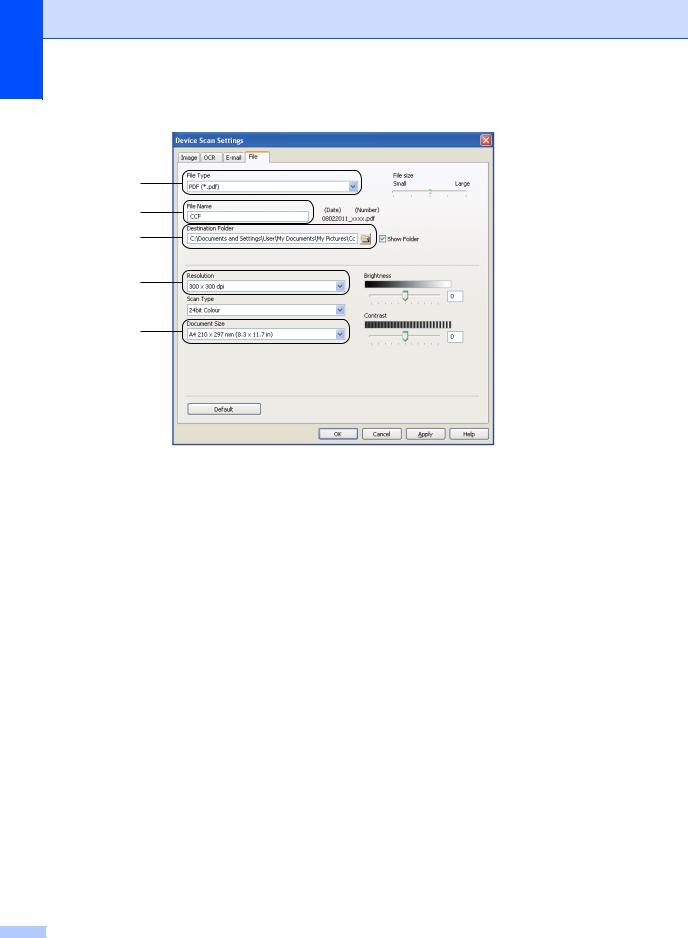
Chapter 7
e Choose the File tab. You can change the default settings.
1
2
3
4
5
1You can choose the file type from the pull-down list.
2You can enter the file name you want to use for the document.
3You can save the file to the default folder, or choose your preferred folder by clicking the  (Browse) button.
(Browse) button.
4You can choose a scanning resolution from the Resolution pull-down list.
5You can choose the document size from the Document Size pull-down list.
f Click OK.
36

How to scan to a computer
Scanning using the SCAN key
a Load your document. (See How to load documents uu page 24.) |
|
|||
b Press |
|
|
(SCAN). |
|
|
|
|||
c Press a or b to choose Scan to PC. |
|
|||
Press OK. |
|
|
||
d Press a or b to choose File. |
|
|||
Press OK. |
|
|
||
e (DCP-8155DN) |
|
|||
If you want to change the duplex setting, press a or b to choose 1sided, 2sided (L)edge |
|
|||
or 2sided (S)edge. |
|
|||
Press OK. |
|
|
||
f (For Network users) |
|
|||
Press a or b to choose the destination computer you want to send to. |
|
|||
Press OK. |
|
7 |
||
If the LCD prompts you to enter a PIN number, enter the 4-digit PIN number for the |
||||
destination computer using the numeric keys on the control panel. Press OK.
g Press a or b to choose Start Scan. Press OK.
h Press Start.
The machine starts the scanning process.
 Note
Note
The following scan modes are available:
Scan to:
•USB
•Network (Windows®) 2
•Image (Scan to PC)
•OCR (Scan to PC) 2
•E-mail (Scan to PC)
•File (Scan to PC)
•FTP 2
•Web Service 1 2 (Web Services Scan)
1Windows® users only. (Windows Vista® SP2 or later and Windows® 7)
(uu Software User's Guide: Using Web Services for scanning on your network (Windows Vista® SP2 or greater and Windows® 7))
2DCP-8110DN and DCP-8155DN only
37

A Routine maintenance
Replacing the consumable items
The following messages appear on the LCD in the Ready mode. These messages provide advanced warnings to replace the consumable items before they reach the end of their life. To avoid any inconvenience, you may want to buy spare consumable items before the machine stops printing.
 Note
Note
The drum unit and toner cartridge are two separate consumables. Make sure both are installed as an assembly. If the toner cartridge is placed in the machine without the drum unit, the messages Drum Error or Jam Inside may be displayed.
|
Toner cartridge |
Drum unit |
|
|
|
|
|
See Replacing the toner cartridge uu page 41. |
See Replacing the drum unit uu page 47. |
||
|
(For Oceania) |
(For Oceania) |
|
Model Name: TN-3310, TN-3340 |
Model Name: DR-3325 |
||
|
(For Asia) |
(For Asia) |
|
Model Name: TN-3320, TN-3350, TN-3370 |
Model Name: DR-3355 |
||
|
|
|
|
TN-3310, TN-3340 / TN-3320, TN-3350 |
|
||
|
|
|
|
|
|
|
|
TN-3370
38

|
|
|
|
|
|
|
|
|
|
|
|
|
|
Routine maintenance |
|||
|
|
|
|
|
|
|
|
|
|
LCD messages |
Consumable item |
Approximate life |
How to replace |
|
Model name |
|
|
|
|
to prepare |
|
|
|
|
|
|
|
Toner Low |
Toner cartridge |
3,000 pages 1 2 3 |
See page 41. |
|
(For Oceania) |
|
|
|
Prepare New |
|
8,000 pages 1 2 4 |
|
|
TN-3310 |
3 |
|
|
|
|
|
|
|
|
||
|
Toner |
|
12,000 pages 1 2 5 |
|
|
TN-3340 4 |
|
|
|
Cartridge. |
|
|
|
|
|||
|
|
|
|
|
|
(For Asia) |
|
|
|
|
|
|
|
|
TN-3320 3 |
|
|
|
|
|
|
|
|
TN-3350 4 |
|
|
|
|
|
|
|
|
TN-3370 5 6 |
|
|
1A4 or Letter size single-sided pages.
2Approx. cartridge yield is declared in accordance with ISO/IEC 19752.
3Standard toner cartridge
4High yield toner cartridge
5Super high yield toner cartridge
6Available for DCP-8155DN
A
39

You will need to clean the machine regularly and replace the consumable items when the following messages are displayed on the LCD.
LCD messages |
Consumable item |
Approximate life |
How to replace |
Model name |
|
to replace |
|
|
|
Replace Toner |
Toner cartridge |
3,000 pages 1 2 5 |
See page 41. |
(For Oceania) |
|
|
8,000 pages 1 2 6 |
|
TN-3310 5 |
|
|
12,000 pages 1 2 7 |
|
TN-3340 6 |
|
|
|
|
(For Asia) |
|
|
|
|
TN-3320 5 |
|
|
|
|
TN-3350 6 |
|
|
|
|
TN-3370 7 8 |
Replace Parts |
Drum unit |
30,000 pages 1 3 4 |
See page 48. |
(For Oceania) |
Drum |
|
|
|
DR-3325 |
|
|
|
|
|
Drum Stop |
|
|
|
|
|
|
|
|
(For Asia) |
|
|
|
|
DR-3355 |
|
|
|
|
|
1A4 or Letter size single-sided pages.
2Approx. cartridge yield is declared in accordance with ISO/IEC 19752.
31 page per job.
4Drum life is approximate and may vary by type of use.
5Standard toner cartridge
6High yield toner cartridge
7Super high yield toner cartridge
8Available for DCP-8155DN
 Note
Note
•Discard used consumable items according to local regulations, keeping it separate from domestic waste. If you have questions, call your local waste disposal office. Be sure to reseal the consumable items tightly so that the material inside does not spill.
•We recommend placing used consumable items on a piece of paper to prevent accidentally spilling or scattering the material inside.
•If you use paper that is not a direct equivalent for the recommended paper, the life of consumable items and machine parts may be reduced.
•The projected life for each of the toner cartridges is based on ISO/IEC 19752. Frequency of replacement will vary depending on the complexity of printed pages, percentage of coverage and type of media used.
•Availability of toner cartridges differs from one country to another. Visit the Brother Solutions Center at http://solutions.brother.com/ or contact your local Brother office for further details.
40

Replacing the toner cartridge
(For Oceania)
Model name: TN-3310, TN-3340 (For Asia)
Model name: TN-3320, TN-3350, TN-3370
The Standard toner cartridge can print
approximately 3,000 pages 1. The High Yield toner cartridge can print approximately 8,000
pages 1. The Super High Yield toner cartridges can print approximately 12,000
pages 1. Actual page count will vary depending on your average type of document.
When the toner cartridge is running low, the LCD shows Toner Low.
The toner cartridge that comes supplied with the machine will need to be replaced after
approximately 3,000 pages 1.
1Approx. cartridge yield is declared in accordance with ISO/IEC 19752.
 Note
Note
•It is a good idea to keep a new toner cartridge ready for use when you see the
Toner Low warning.
•To ensure high quality printing, we recommend that you use only Brother Original toner cartridges. When you want to buy toner cartridges, please call your Brother dealer.
•If you print graphics, bold text, charts, web pages with borders, and other types of printouts that consist of more than simple text, the amount of toner used will increase.
•We recommend that you clean the machine when you replace the toner cartridge. See Cleaning and Checking the machine uu page 52.
•If you change the print density setting for lighter or darker printing, the amount of toner used will change.
•Wait to unpack the toner cartridge until immediately before you put it into the machine.
Routine maintenance
Toner Low
Toner Low
Prepare...
If the LCD shows Toner Low, buy a new toner cartridge and have it ready before you get a Replace Toner message.
Replace Toner
When the following message appears on the LCD, you need to replace the toner cartridge:
Replace Toner
Open the...
The machine will stop printing until you replace the toner cartridge. A new Brother
Original toner cartridge will clear the replace A toner message.
41

Replacing the toner cartridge
a Leave the machine turned on for
10 minutes for the internal fan to cool the extremely hot parts inside the machine.
b Press the front cover release button and then open the front cover.
c Take out the drum unit and toner cartridge assembly.
 WARNING
WARNING
 HOT SURFACE
HOT SURFACE
After you have just used the machine, some internal parts of the machine will be extremely hot. Wait for the machine to cool down before you touch the internal parts of the machine.
42

 Important
Important
•We recommend that you place the drum unit and toner cartridge assembly on a clean, flat surface with a piece of disposable paper underneath it in case you accidentally spill or scatter toner.
•To prevent damage to the machine from static electricity, DO NOT touch the electrodes shown in the illustration.
d Push down the green lock lever and take the toner cartridge out of the drum unit.
Routine maintenance
 WARNING
WARNING
•DO NOT put a toner cartridge or a toner cartridge and drum unit assembly into a fire. It could explode, resulting in injuries.
•DO NOT use flammable substances, any type of spray, or an organic solvent/liquid containing alcohol or ammonia to clean the inside or outside of the machine. Doing so could cause a fire or electrical shock. Instead, use only a dry, lint-free cloth.
(uu Product Safety Guide: General precautions)
A
43

 Important
Important
•Handle the toner cartridge carefully. If toner scatters on your hands or clothes, immediately wipe or wash it off with cold water.
•To avoid print quality problems, DO NOT touch the shaded parts shown in the illustrations.
<Toner cartridge>
<Drum unit>
•We recommend that you place the toner cartridge on a clean, flat, level, stable surface with a sheet of disposable paper or cloth underneath it in case you accidentally spill or scatter toner.
 Note
Note
•Be sure to seal up the used toner cartridge tightly in a suitable bag so that toner powder does not spill out of the cartridge.
•Discard used consumable items according to local regulations, keeping it separate from domestic waste. If you have questions, call your local waste disposal office. Be sure to reseal the consumable items tightly so that the material inside does not spill.
e Unpack the new toner cartridge. Hold the cartridge level with both hands and gently shake it from side to side several times to spread the toner evenly inside the cartridge.
44

 Important
Important
•Unpack the toner cartridge just before you put it in the machine. If a toner cartridge is left unpacked for a long time, the toner life will be shortened.
•If an unpacked drum unit is put in direct sunlight or room light, the unit may be damaged.
•Brother machines are designed to work with toner of a particular specification and will work to a level of optimum performance when used with Brother Original toner cartridges. Brother cannot guarantee this optimum performance if toner or toner cartridges of other specifications are used. The machine may not detect toner or toner cartridges of other specifications correctly but may instead detect such items as standard yield toner cartridges. Brother does not therefore recommend the use of cartridges other than Brother Original cartridges with this machine, or the refilling of empty cartridges with toner from other sources. If damage is caused to the drum unit or other parts of this machine as a result of the use of toner or toner cartridges other than Brother Original products, due to the incompatibility or lack of suitability of those products with this machine, any repairs required as a result may not be covered by the warranty.
f Pull off the protective cover.
Routine maintenance
 Important
Important
Put the toner cartridge in the drum unit immediately after you have removed the protective cover. To prevent any degradation to the print quality, DO NOT touch the shaded parts shown in the illustrations.
g Put the new toner cartridge firmly into |
|
the drum unit until you hear it lock into |
|
place. If you put it in correctly, the green |
|
lock lever on the drum unit will lift |
|
automatically. |
A |
|
45

 Note
Note
Make sure that you put in the toner cartridge correctly or it may separate from the drum unit.
h Clean the corona wire inside the drum unit by gently sliding the green tab back and forth several times.
j Close the front cover of the machine.
 Note
Note
After you replace a toner cartridge, DO NOT turn off the machine's power switch or open the front cover until the LCD clears the Please Wait message and returns to Ready mode.
1
 Note
Note
Be sure to return the tab to the home position (a) (1). If you do not, printed pages may have a vertical stripe.
i Put the drum unit and toner cartridge assembly back into the machine.
46

Replacing the drum unit
(For Oceania)
Model name: DR-3325 (For Asia)
Model name: DR-3355
A new drum unit can print approximately 30,000 A4 or Letter size single-sided pages.
 Important
Important
For best performance, use a Brother Original drum unit and Brother Original toner units. Printing with a third-party drum unit or toner unit may reduce not only the print quality but also the quality and life of the machine itself. Warranty coverage may not apply to problems caused by the use of a third-party drum or toner unit.
Drum Error
Drum Error
Open the...
The corona wire has become dirty. Clean the corona wire in the drum unit. (See Cleaning the corona wire uu page 54.)
If you cleaned the corona wire and
Drum Error was not cleared then the drum unit is at the end of its life. Replace the drum unit with a new one.
Replace Parts
Drum
Replace Parts
Drum
The drum unit has exceeded its rated life. Please replace the drum unit with a new one. We recommend that a Brother Original drum unit is installed at this time.
Routine maintenance
After replacement, reset the drum counter by following the instructions included with the new drum unit. (See Resetting the drum counter uu page 51.)
Drum Stop
Drum Stop
Replace the...
We cannot guarantee the print quality. Please replace the drum unit with a new one. We recommend that a Brother Original drum unit is installed at this time.
After replacement, reset the drum counter by following the instructions included with the new drum unit. (See Resetting the drum counter uu page 51.)
A
47

Replacing the drum unit
 Important
Important
•While removing the drum unit, handle it carefully because it may contain toner. If toner scatters on your hands or clothes, immediately wipe or wash it off with cold water.
•Every time you replace the drum unit, clean the inside of the machine. (See
Cleaning and Checking the machine uu page 52.)
•Wait to unpack the new drum unit immediately before you put it in the machine. Exposure to direct sunlight or room light may damage the drum unit.
a Leave the machine turned on for
10 minutes for the internal fan to cool the extremely hot parts inside the machine.
b Press the front cover release button and then open the front cover.
48
c Take out the drum unit and toner cartridge assembly.
 WARNING
WARNING
 HOT SURFACE
HOT SURFACE
After you have just used the machine, some internal parts of the machine will be extremely hot. Wait for the machine to cool down before you touch the internal parts of the machine.

 Important
Important
•We recommend that you place the drum unit and toner cartridge assembly on a clean, flat surface with a piece of disposable paper underneath it in case you accidentally spill or scatter toner.
•To prevent damage to the machine from static electricity, DO NOT touch the electrodes shown in the illustration.
d Push down the green lock lever and take the toner cartridge out of the drum unit.
Routine maintenance
 WARNING
WARNING
•DO NOT put a toner cartridge or a toner cartridge and drum unit assembly into a fire. It could explode, resulting in injuries.
•DO NOT use flammable substances, any type of spray, or an organic solvent/liquid containing alcohol or ammonia to clean the inside or outside of the machine. Doing so could cause a fire or electrical shock. Instead, use only a dry, lint-free cloth.
(uu Product Safety Guide: General precautions)
A
49

 Important
Important
•Handle the toner cartridge carefully. If toner scatters on your hands or clothes, immediately wipe or wash it off with cold water.
•To avoid print quality problems, DO NOT touch the shaded parts shown in the illustrations.
<Toner cartridge>
<Drum unit>
•We recommend that you place the toner cartridge on a clean, flat, level, stable surface with a sheet of disposable paper or cloth underneath it in case you accidentally spill or scatter toner.
 Note
Note
•Be sure to seal up the used drum unit tightly in a suitable bag so that toner powder does not spill out of the drum unit.
•Discard used consumable items according to local regulations, keeping it separate from domestic waste. If you have questions, call your local waste disposal office. Be sure to reseal the consumable items tightly so that the material inside does not spill.
e Unpack the new drum unit.
f Put the toner cartridge firmly into the new drum unit until you hear it lock into place. If you put the cartridge in correctly, the green lock lever will lift automatically.
50

Routine maintenance
 Note
Note
Make sure that you put in the toner cartridge correctly or it may separate from the drum unit.
g Put the drum unit and toner cartridge assembly back into the machine. Do not close the front cover of the machine.
A
Resetting the drum counter
When you replace a drum unit with a new one, you need to reset the drum counter by completing the following steps:
 Important
Important
Do not reset the drum counter when you only replace the toner cartridge.
a With the front cover still open, press
Clear.
b To confirm you are installing a new drum, press 1.
c When the LCD shows Accepted, close the front cover of the machine.
51

Cleaning and Checking the machine
Clean the outside and inside of the machine regularly with a dry, lint-free cloth. When you replace the toner cartridge or the drum unit, make sure that you clean the inside of the machine. If printed pages are stained with toner, clean the inside of the machine with a dry, lint-free cloth.
 WARNING
WARNING
•DO NOT put a toner cartridge or a toner cartridge and drum unit assembly into a fire. It could explode, resulting in injuries.
•DO NOT use flammable substances, any type of spray, or an organic solvent/liquid containing alcohol or ammonia to clean the inside or outside of the machine. Doing so could cause a fire or electrical shock. Instead, use only a dry, lint-free cloth.
(uu Product Safety Guide: General precautions)
 Important
Important
Use neutral detergents. Cleaning with volatile liquids such as thinner or benzine will damage the surface of the machine.
52
Cleaning the outside of the machine
a Turn off the machine.
b Disconnect the interface cables from the machine, and then unplug the power cord from the electrical socket.
c Wipe the outside of the machine with a dry, lint-free cloth to remove dust.
d Pull the paper tray completely out of the machine.
e If paper is loaded in the paper tray, remove it.

f g
h i
j
Remove anything that is stuck inside the paper tray.
Wipe the inside and the outside of the paper tray with a dry, lint-free cloth to remove dust.
Re-load the paper and put the paper tray firmly back in the machine.
Plug the machine’s power cord back into the electrical socket first, then connect all cables.
Turn on the machine.
Routine maintenance
Cleaning the scanner glass
a Turn off the machine.
b Disconnect all cables, and then unplug the power cord from the electrical socket.
c Lift the document cover (1).
Clean the white plastic surface (2) and scanner glass (3) underneath it with a soft lint-free cloth moistened with water.
 1
1
2
 3 A
3 A
d In the ADF unit, clean the white bar (1) and the scanner glass strip (2) underneath it with a soft lint-free cloth moistened with water.
1
53
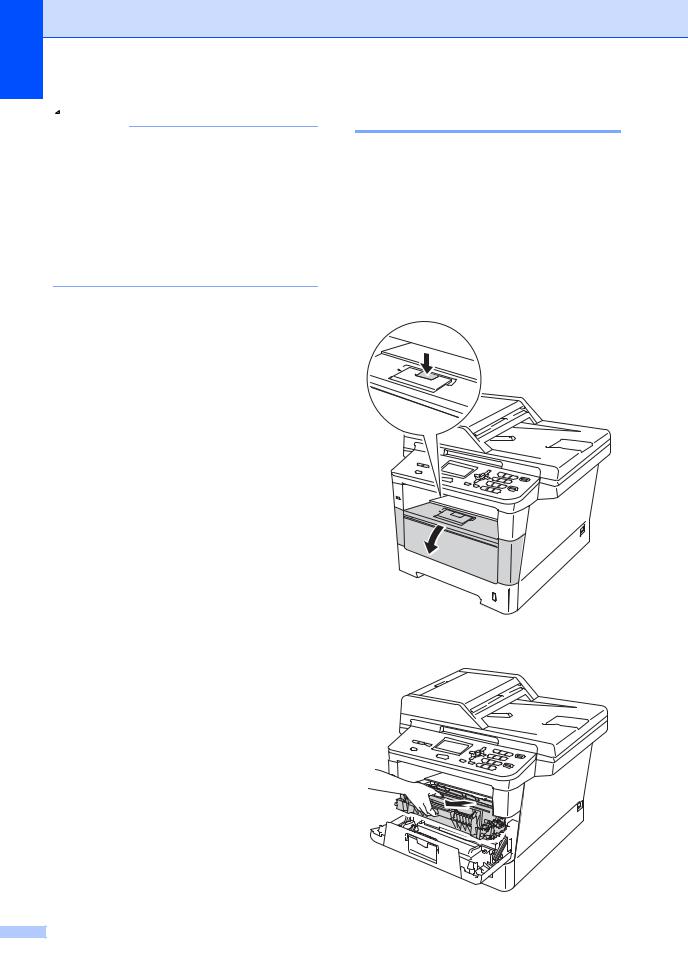
 Note
Note
In addition to cleaning the scanner glass and glass strip with a soft lint-free cloth moistened with water, run your finger tip over the glass to see if you can feel anything on it. If you feel dirt or debris, clean the glass again concentrating on that area. You may need to repeat the cleaning process three or four times. To test, make a copy after each cleaning.
e Close the document cover.
f Plug the machine’s power cord back into the electrical socket first, then connect all cables.
g Turn on the machine.
Cleaning the corona wire
If you have print quality problems or the LCD shows Drum Error, clean the corona wire as follows:
a Leave the machine turned on for
10 minutes for the internal fan to cool the internal parts of the machine that are extremely hot.
b Press the front cover release button and then open the front cover.
c Take out the drum unit and toner cartridge assembly.
54

 WARNING
WARNING
 HOT SURFACE
HOT SURFACE
After you have just used the machine, some internal parts of the machine will be extremely hot. Wait for the machine to cool down before you touch the internal parts of the machine.
Routine maintenance
 Important
Important
•We recommend that you put the drum unit and toner cartridge assembly on a piece of disposable paper or cloth in case you accidentally spill or scatter toner.
•Handle the drum unit and toner cartridge assembly carefully. If toner scatters on your hands or clothes, wipe or wash it off with cold water.
•To prevent damage to the machine from static electricity, DO NOT touch the electrodes shown in the illustration.
A
55

d Clean the corona wire inside the drum unit by gently sliding the green tab back and forth several times.
1
 Note
Note
Be sure to return the tab to the home position (a) (1). If you do not, printed pages may have a vertical stripe.
e Put the drum unit and toner cartridge assembly back into the machine.
f Close the front cover of the machine.
Cleaning the drum unit
If your printout has dots at 94 mm intervals, follow the steps below to solve the problem.
a Make sure that the machine is in the Ready mode. (DCP-8110DN and DCP-8155DN) Press Menu, 6, 6, (DCP-8110D) Menu, 5, 5, then press Start to print the drum dot check sheet.
66.Drum Dot Print
Printing
b Leave the machine turned on for 10 minutes for the internal fan to cool the internal parts of the machine that are extremely hot.
c After the machine has cooled down, turn off the machine.
d Press the front cover release button and then open the front cover.
56

e Take out the drum unit and toner cartridge assembly.
Routine maintenance
 Important
Important
•We recommend that you put the drum unit and toner cartridge assembly on a piece of disposable paper or cloth in case you accidentally spill or scatter toner.
•Handle the drum unit and toner cartridge assembly carefully. If toner scatters on your hands or clothes, wipe or wash it off with cold water.
•To prevent damage to the machine from static electricity, DO NOT touch the electrodes shown in the illustration.
 WARNING
WARNING
 HOT SURFACE
HOT SURFACE
After you have just used the machine, some internal parts of the machine will be extremely hot. Wait for the machine to cool down before you touch the internal parts of the machine.
A
57

f Push down the green lock lever and take the toner cartridge out of the drum unit.
g Turn the drum unit as shown in the illustration. Make sure that the drum unit gear (1) is on the left hand side.
h Use the numbered markers next to the drum roller to find the mark. For example, a dot in column 2 on the check sheet would mean that there is a mark in the "2" region of the drum.
1
58
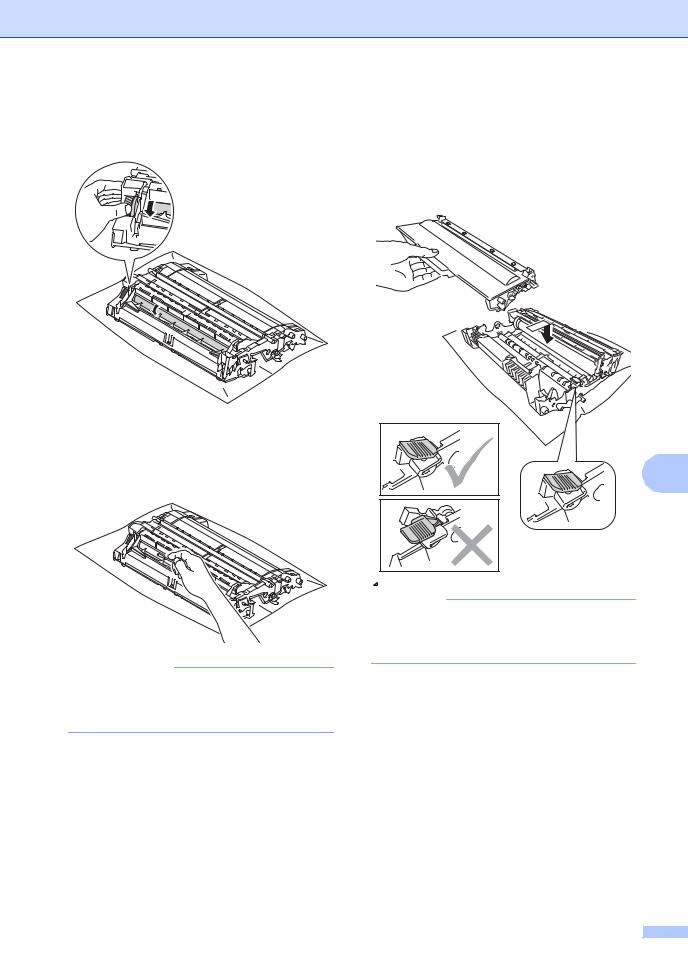
i Turn the drum unit gear toward you by hand while checking the surface of the suspected area.
j When you have found the mark on the drum that matches the drum dot check sheet, wipe the surface of the drum gently with a dry cotton swab until the mark on the surface comes off.
 Important
Important
DO NOT clean the surface of the photosensitive drum with a sharp object or any liquids.
k Turn the drum unit back over.
Routine maintenance
l Put the toner cartridge back into the drum unit until you hear it lock into place. If you put the cartridge in correctly, the green lock lever on the drum unit will lift automatically.
A
 Note
Note
Make sure that you put in the toner cartridge correctly or it may separate from the drum unit.
59

m Put the drum unit and toner cartridge assembly back into the machine.
n Close the front cover of the machine.
o Turn on the machine and try a test print.
Cleaning the paper pick-up rollers
Cleaning the paper pick-up roller periodically may prevent paper jams by ensuring the correct feeding of the paper.
If you have paper feed problems, clean the pick-up rollers as follows:
a Turn off the machine.
b Disconnect all cables, and then unplug the power cord from the electrical socket.
c Pull the paper tray completely out of the machine.
60

|
|
|
Routine maintenance |
d Tightly wring out a lint-free cloth soaked |
h Turn on the machine. |
in lukewarm water, and then wipe the |
|
separator pad (1) on the paper tray to |
|
remove dust. |
|
 1
1
e Wipe the two pick-up rollers (1) inside the machine to remove dust.
1

f Put the paper tray back in the machine.
g Plug the machine’s power cord back into the electrical socket.
A
61

B Troubleshooting
If you think there is a problem with your machine, check each of the items below first and then follow the troubleshooting tips.
You can correct most problems by yourself. If you need additional help, the Brother Solutions Center offers the latest FAQs and troubleshooting tips.
Visit us at http://solutions.brother.com/.
Identifying your problem
First, check the following:
The machine's power cord is connected correctly and the machine’s power switch is turned on. If the machine does not turn on after connecting the power cord, see Other difficulties
uu page 87.
All of the protective parts have been removed.
Paper is inserted correctly in the paper tray.
The interface cables are securely connected to the machine and the computer.
LCD Messages
(See Error and maintenance messages uu page 63)
If you did not solve the problem with the above checks, identify your problem and then go to the page suggested below.
Paper handling and Printing problems:
Printing difficulties uu page 82
Paper handling difficulties uu page 84
Copying problems:
Copying difficulties uu page 85
Scanning problems:
Scanning difficulties uu page 85
Software and Network problems:
Software difficulties uu page 85
Network difficulties (for DCP-8110DN and DCP-8155DN) uu page 86
62

Troubleshooting
Error and maintenance messages
As with any sophisticated office product, errors may occur and consumable items may need to be replaced. If this happens, your machine identifies the error or required routine maintenance and shows the appropriate message. The most common error and maintenance messages are shown below.
You can clear most errors and perform routine maintenance by yourself. If you need more help, the Brother Solutions Center offers the latest FAQs and troubleshooting tips:
Visit us at http://solutions.brother.com/.
Error Message |
Cause |
Action |
|
|
Access Denied |
The function you want to use is |
Contact your administrator to check your |
|
|
(except DCP-8110D) |
restricted by Secure Function |
Secure Function Lock Settings. |
|
|
Lock 2.0. |
|
|
||
|
|
|
||
|
|
|
|
|
Access Error |
The device is removed from |
Press Stop/Exit. Reinsert the device and try to |
|
|
|
the USB direct interface while |
print with Direct Print. |
|
|
|
the data is processing. |
|
|
|
|
|
|
|
|
Cartridge Error |
The toner cartridge is not |
Pull out the drum unit and toner cartridge |
|
|
Put the Toner |
installed correctly. |
assembly, take out the toner cartridge, and put |
|
|
Cartridge back |
|
it back into the drum unit again. Put the drum |
|
|
in. |
|
unit and toner cartridge assembly back in the |
|
|
|
|
machine. |
|
|
|
|
|
|
|
Cooling Down |
The temperature of the drum |
Make sure that you can hear the fan in the |
B |
|
Wait for a while |
unit or toner cartridge is too |
machine spinning and that the exhaust outlet is |
||
hot. The machine will pause its |
not blocked by something. |
|||
|
|
|||
|
current print job and go into |
If the fan is spinning, remove any obstacles |
|
|
|
cooling down mode. During the |
|
||
|
that surround the exhaust outlet, and then |
|
||
|
cooling down mode, you will |
|
||
|
leave the machine turned on but do not use it |
|
||
|
hear the cooling fan running |
|
||
|
for several minutes. |
|
||
|
while the LCD shows Cooling |
|
||
|
If the fan is not spinning, disconnect the |
|
||
|
Down, and Wait for a |
|
||
|
while. |
machine from the power for several minutes, |
|
|
|
|
then reconnect it. |
|
|
|
|
|
|
|
Cover is Open |
The front cover is not |
Close the front cover of the machine. |
|
|
|
completely closed. |
|
|
|
|
|
|
|
|
|
The ADF cover is not |
Close the ADF cover of the machine. |
|
|
|
completely closed. |
|
|
|
|
|
|
|
|
|
The ADF is open while loading |
Close the ADF cover of the machine, then |
|
|
|
a document. |
press Stop/Exit. |
|
|
|
|
|
|
|
|
The fuser cover is not |
Close the fuser cover of the machine. |
|
|
|
completely closed or paper |
Make sure paper is not jammed behind the |
|
|
|
was jammed in the back of the |
|
||
|
machine when you turned on |
fuser cover at the back of the machine, then |
|
|
|
close the fuser cover and press Start. |
|
||
|
the power. |
|
||
|
(See Paper is jammed at the back of the |
|
||
|
|
|
||
|
|
machine uu page 73.) |
|
|
|
|
|
|
63

|
|
|
|
|
|
|
|
|
|
|
|
|
|
|
|
|
|
|
|
Error Message |
Cause |
Action |
|
|
|
DIMM Error |
The DIMM is not installed |
Turn off the machine and remove the |
|
|
|
|
correctly. |
DIMM. |
|
|
|
|
The DIMM is broken. |
(uu Advanced User's Guide: Installing |
|
|
|
|
The DIMM does not meet |
extra memory) |
|
|
|
|
|
|
|
|
|
|
the required specifications. |
Confirm the DIMM meets the required |
|
|
|
|
|
specifications. |
|
|
|
|
|
(uu Advanced User's Guide: Memory |
|
|
|
|
|
board) |
|
|
|
|
|
Re-install the DIMM correctly. Wait a few |
|
|
|
|
|
seconds, and then turn it on again. |
|
|
|
|
|
If this error message appears again, |
|
|
|
|
|
replace the DIMM with a new one. |
|
|
|
|
|
(uu Advanced User's Guide: Installing |
|
|
|
|
|
extra memory) |
|
|
|
|
|
|
|
|
|
Document Jam |
The document was not |
See Document is jammed in the top of the ADF |
|
|
|
|
inserted or fed correctly, or the |
unit uu page 69 or Using the automatic |
|
|
|
|
document scanned from the |
document feeder (ADF) uu page 24. |
|
|
|
|
ADF was too long. |
|
|
|
|
|
|
|
|
|
|
Drum Error |
The corona wire on the drum |
Clean the corona wire on the drum unit. |
|
|
|
|
unit needs to be cleaned. |
(See Cleaning the corona wire uu page 54.) |
|
|
|
|
|
|
|
|
|
|
|
|
|
|
|
|
The toner cartridge is placed in |
Put the toner cartridge into the drum unit, and |
|
|
|
|
the machine without the drum |
then re-install the drum unit and toner cartridge |
|
|
|
|
unit. |
assembly in the machine. |
|
|
|
|
|
|
|
|
|
Drum Stop |
It is time to replace the drum |
Replace the drum unit. |
|
|
|
|
unit. |
(See Replacing the drum unit uu page 48.) |
|
|
|
|
|
|
|
|
|
|
|
|
|
|
|
Duplex Disabled |
The back cover of the machine |
Close the back cover of the machine. |
|
|
|
|
is not closed completely. |
|
|
|
|
|
|
|
|
|
|
Fuser Error |
The temperature of the fuser |
Turn the power switch off, wait a few seconds, |
|
|
|
|
unit does not rise to a specified |
and then turn it on again. Leave the machine |
|
|
|
|
temperature within the |
idle for 15 minutes with the power on. |
|
|
|
|
specified time. |
|
|
|
|
|
|
|
|
|
|
|
The fuser unit is too hot. |
|
|
|
|
|
|
|
|
|
|
Jam Duplex |
The paper is jammed in the |
See Paper is jammed in the duplex tray |
|
|
|
|
duplex tray or the fuser unit. |
uu page 80. |
|
|
|
|
|
|
|
|
|
Jam Inside |
The paper is jammed inside the |
See Paper is jammed inside the machine |
|
|
|
|
machine. |
uu page 76. |
|
|
|
|
|
|
|
|
|
|
The toner cartridge is placed in |
Put the toner cartridge into the drum unit, and |
|
|
|
|
the machine without the drum |
then re-install the drum unit and toner cartridge |
|
|
|
|
unit. |
assembly in the machine. |
|
|
|
|
|
|
|
|
|
Jam MP Tray |
The paper is jammed in the MP |
See Paper is jammed in the MP tray |
|
|
|
|
tray of the machine. |
uu page 71. |
|
|
|
|
|
|
|
|
|
Jam Rear |
The paper is jammed in the |
See Paper is jammed at the back of the |
|
|
|
|
back of the machine. |
machine uu page 73. |
|
|
|
|
|
|
|
64

|
|
|
|
|
|
|
|
Troubleshooting |
|
|
|
|
|
|
|
Error Message |
Cause |
Action |
|
|
Jam Tray 1 |
The paper is jammed in the |
See Paper is jammed in paper tray 1 or tray 2 |
|
|
Jam Tray 2 |
paper tray of the machine. |
uu page 72. |
|
|
|
|
|
|
|
|
|
|
|
|
Limit Exceeded |
The number of pages you are |
Contact your administrator to check your |
|
|
(except DCP-8110D) |
allowed to print has been |
Secure Function Lock Settings. |
|
|
exceeded. The print job will be |
|
|
|
|
|
|
|
|
|
|
cancelled. |
|
|
|
|
|
|
|
|
Log Access Error |
The machine could not access |
Contact your administrator to check the Store |
|
|
(except DCP-8110D) |
the print log file in the server. |
Print Log to Network settings. |
|
|
|
For detailed information uu Network User's |
|
|
|
|
|
|
|
|
|
|
Guide: Store Print Log to Network |
|
|
|
|
|
|
|
Manual Feed |
Manual was selected as the |
Place paper in the MP tray. If the machine is in |
|
|
|
paper source when there was |
Pause mode, press Start. (See Loading paper |
|
|
|
no paper in the MP tray. |
in the multi-purpose tray (MP tray) |
|
|
|
|
uu page 12) |
|
|
|
|
|
|
|
No HUB Support |
A USB hub device is |
Disconnect the USB hub device from the USB |
|
|
|
connected to the USB direct |
direct interface. |
|
|
|
interface. |
|
|
|
|
|
|
|
|
No Paper |
The machine is out of paper in |
Do one of the following: |
|
|
|
the specified tray or all trays, or |
Refill paper in the paper tray shown on the |
|
|
|
paper is not correctly loaded in |
LCD. Make sure the paper guides are set to |
|
|
|
the paper tray. |
|
|
|
|
the correct size. |
|
|
|
|
|
|
|
|
|
|
Remove the paper and load it again. Make |
B |
|
|
|
sure the paper guides are set to the correct |
|
|
|
|
size. |
|
|
|
|
|
|
|
No Toner |
The toner cartridge or the drum |
Remove the drum unit and toner cartridge |
|
|
|
unit and toner cartridge |
assembly, remove the toner cartridge from the |
|
|
|
assembly is not installed |
drum unit, and re-install the toner cartridge |
|
|
|
correctly. |
back into the drum unit again. Re-install the |
|
|
|
|
drum unit and toner cartridge assembly back in |
|
|
|
|
the machine. If the problem continues, replace |
|
|
|
|
the toner cartridge. |
|
|
|
|
(See Replacing the toner cartridge |
|
|
|
|
uu page 41.) |
|
|
|
|
|
|
|
No Tray |
The standard paper tray is not |
Re-install the standard paper tray. |
|
|
|
installed or not installed |
|
|
|
|
correctly. |
|
|
|
|
|
|
|
|
Not Available |
The requested function is not |
Contact your administrator to check your |
|
|
(except DCP-8110D) |
permitted to all User IDs by |
Secure Function Lock Settings. |
|
|
Secure Function Lock 2.0. |
|
|
|
|
|
|
|
|
|
|
|
|
|
65

|
|
|
|
|
|
|
|
|
|
|
|
|
|
|
|
|
|
|
|
Error Message |
Cause |
Action |
|
|
|
Out of Memory |
The machine’s memory is full. |
Copy operation in process |
|
|
|
|
|
Do one of the following: |
|
|
|
|
|
Press Start to copy the scanned pages. |
|
|
|
|
|
Press Stop/Exit and wait until the other |
|
|
|
|
|
operations in progress finish, and then try |
|
|
|
|
|
again. |
|
|
|
|
|
Add optional memory. |
|
|
|
|
|
(uu Advanced User's Guide: Memory |
|
|
|
|
|
board) |
|
|
|
|
|
Print operation in process |
|
|
|
|
|
Do one of the following: |
|
|
|
|
|
Reduce the print resolution. |
|
|
|
|
|
(uu Software User's Guide: Printing (for |
|
|
|
|
|
Windows®) or Printing and Faxing (for |
|
|
|
|
|
Macintosh)) |
|
|
|
|
|
Add optional memory. |
|
|
|
|
|
(uu Advanced User's Guide: Memory |
|
|
|
|
|
board) |
|
|
|
|
|
|
|
|
|
Out of Memory |
The machine’s memory is full. |
Press Stop/Exit and delete the previously |
|
|
|
Secure Print Data |
|
stored secure print data. |
|
|
|
|
(uu Software User's Guide: Secure Print Key) |
|
|
|
|
is full. |
|
|
|
|
|
|
|
|
|
|
|
Print Unable XX |
The machine has a mechanical |
Do one of the following: |
|
|
|
(XX = Error Code) |
problem. |
Turn the power switch off, wait a few |
|
|
|
|
|
||
|
|
|
|
minutes, and then turn it on again. |
|
|
|
|
|
If the problem continues, call Brother |
|
|
|
|
|
customer service for support. |
|
|
|
|
|
|
|
|
|
Protected Device |
The protect switch of the USB |
Turn off the protect switch of the USB Flash |
|
|
|
|
Flash memory drive is on. |
memory drive. |
|
|
|
|
|
|
|
|
|
Rename the File |
There is already a file on the |
Change the file name of the file on the USB |
|
|
|
|
USB Flash memory drive with |
Flash memory drive or the file you are trying to |
|
|
|
|
the same name as the file you |
save. |
|
|
|
|
are trying to save. |
|
|
|
|
|
|
|
|
|
|
Replace Parts |
It is time to replace the drum |
Replace the drum unit. |
|
|
|
Drum |
unit. |
(See Replacing the drum unit uu page 48.) |
|
|
|
|
|
|
|
|
|
|
|
|
|
|
|
|
The drum unit counter was not |
Reset the drum unit counter. |
|
|
|
|
reset when a new drum was |
(See Resetting the drum counter uu page 51.) |
|
|
|
|
installed. |
|
|
|
|
|
|
|
|
|
|
|
|
|
|
|
|
Replace Parts |
It is time to replace the fuser |
Call Brother customer service or a Brother |
|
|
|
Fuser Unit |
unit. |
Authorized Service Center to replace the fuser |
|
|
|
|
unit. |
|
|
|
|
|
|
|
|
|
|
|
|
|
|
66

|
|
|
|
|
|
|
|
Troubleshooting |
|
|
|
|
|
|
|
Error Message |
Cause |
Action |
|
|
Replace Parts |
It is time to replace the laser |
Call Brother customer service or a Brother |
|
|
Laser Unit |
unit. |
Authorized Service Center to replace the laser |
|
|
|
unit. |
|
|
|
|
|
|
|
|
|
|
|
|
|
Replace Parts |
It is time to replace the paper |
Call Brother customer service or a Brother |
|
|
PF Kit 1 |
feeding kit. |
Authorized Service Center to replace the |
|
|
|
PF Kit. |
|
|
|
|
|
|
|
|
PF Kit 2 |
|
|
|
|
PF Kit MP |
|
|
|
|
|
|
|
|
|
Replace Toner |
The toner cartridge is at the |
Replace the toner cartridge. |
|
|
|
end of its life. The machine will |
(See Replacing the toner cartridge |
|
|
|
stop all print operations. |
|
|
|
|
uu page 41.) |
|
|
|
|
|
|
|
|
|
|
|
|
|
Scan Unable XX |
The machine has a mechanical |
Turn the power switch off, and then turn it |
|
|
(XX = Error Code) |
problem. |
on again. |
|
|
|
If the problem continues, call Brother |
|
|
|
|
|
|
|
|
|
|
customer service for support. |
|
|
|
|
|
|
|
|
Document is too long for |
Press Stop/Exit. Use a suitable size of paper |
|
|
|
duplex scanning. |
for duplex scanning. |
|
|
|
|
(See Paper capacity of the paper trays |
|
|
|
|
uu page 20.) |
|
|
|
|
|
|
|
Size Error |
The paper size defined in the |
Choose a paper size which is supported by the |
|
|
|
printer driver is not suitable for |
tray shown on the LCD. |
|
|
|
the tray in use. |
(See Paper Size uu page 17.) |
B |
|
|
|
||
|
|
|
|
|
|
Size Error DX |
The paper size defined in the |
Press Stop/Exit. Choose a paper size which is |
|
|
|
printer driver and the control |
supported by the duplex tray. |
|
|
|
panel menu is not suitable for |
The paper size you can use for automatic |
|
|
|
automatic duplex printing. |
|
|
|
|
duplex printing is A4. |
|
|
|
|
|
|
|
|
|
|
|
|
|
|
The paper in the tray is not the |
Press Start. Load the correct size of paper in |
|
|
|
correct size and is not suitable |
the tray and set the “Paper Size” (Menu, 1, 1, |
|
|
|
for automatic duplex printing. |
2). |
|
|
|
|
The paper size you can use for automatic |
|
|
|
|
duplex printing is A4. |
|
|
|
|
|
|
|
Size mismatch |
The paper in the tray is not the |
Load the correct size of paper in the tray and |
|
|
|
correct size. |
set the “Paper Size” (Menu, 1, 1, 2). |
|
|
|
|
(See Paper Size uu page 17.) |
|
|
|
|
|
|
|
Toner Low |
If the LCD shows Toner Low |
Order a new toner cartridge now so a |
|
|
|
you can still print; however, the |
replacement toner cartridge will be available |
|
|
|
machine is telling you that the |
when the LCD shows Replace Toner. |
|
|
|
toner cartridge is near the end |
|
|
|
|
of its life. |
|
|
|
|
|
|
|
|
Too Many Files |
There are too many files stored |
Reduce the number of files stored on the USB |
|
|
|
on the USB Flash memory |
Flash memory drive. |
|
|
|
drive. |
|
|
|
|
|
|
|
67

|
|
|
|
|
|
|
|
|
|
|
|
|
|
|
|
|
|
|
|
Error Message |
Cause |
Action |
|
|
|
Unusable Device |
A defective USB device or a |
Unplug the device from the USB direct |
|
|
|
Remove the |
high power consumption USB |
interface. Turn the machine off and then on |
|
|
|
device has been connected to |
again. |
|
|
|
|
Device. Turn the |
|
||
|
|
the USB direct interface. |
|
|
|
|
|
power off and |
|
|
|
|
|
|
|
|
|
|
|
back on again. |
|
|
|
|
|
|
|
|
|
|
|
Unusable Device |
A USB device or USB Flash |
Unplug the device from the USB direct |
|
|
|
|
memory drive that is not |
interface. |
|
|
|
|
supported/is encrypted has |
See the specifications for supported USB Flash |
|
|
|
|
been connected to the USB |
|
|
|
|
|
memory drives in Printing data from a USB |
|
|
|
|
|
direct interface. |
|
|
|
|
|
Flash memory drive or digital camera |
|
|
|
|
|
|
|
|
|
|
|
|
supporting mass storage uu page 27. |
|
|
|
|
|
|
|
|
|
Wrong Paper Size |
The machine cannot find paper |
Load the paper in the paper tray shown on the |
|
|
|
|
of the same size in any other |
LCD. |
|
|
|
|
tray after the tray currently in |
|
|
|
|
|
use has run out of paper during |
|
|
|
|
|
a copy operation. |
|
|
|
|
|
|
|
|
68

Document Jams
Document is jammed in the top of the ADF unit
a Take out any paper from the ADF that is not jammed.
b Open the ADF cover.
c Pull the jammed document out to the left.
If the document rips or tears, be sure you remove all small paper scraps to prevent future jams.
d Close the ADF cover. e Press Stop/Exit.
Troubleshooting
Document is jammed under the document cover
a Take out any paper from the ADF that is not jammed.
b Lift the document cover.
c Pull the jammed document out to the right.
B
If the document rips or tears, be sure you remove all small paper scraps to prevent future jams.
d Close the document cover. e Press Stop/Exit.
69

Removing small documents jammed in the ADF
a Lift the document cover.
b Insert a piece of stiff paper, such as cardstock, into the ADF to push any small paper scraps through.
c Close the document cover. d Press Stop/Exit.
d Press Stop/Exit.
Document is jammed at the output tray
a Take out any paper from the ADF that is not jammed.
b Pull the jammed document out to the right.
c Press Stop/Exit.
70

Paper Jams
Always remove all paper from the paper tray and straighten the stack when you add new paper. This helps prevent paper jams and multiple sheets of paper from feeding through the machine at the same time.
Paper is jammed in the MP tray
If the LCD shows Jam MP Tray, follow these steps:
a Remove the paper from the MP tray.
b Remove any jammed paper from in and around the MP tray.
c Fan the paper stack, and then put it back in the MP tray.
Troubleshooting
d When loading paper in the MP tray, make sure that the paper stays under the maximum paper height guides (1) on both sides of the tray.
1
e Press Start to resume printing. |
B |
71

Paper is jammed in paper tray 1 or tray 2
If the LCD shows Jam Tray 1 or Jam Tray 2, follow these steps:
a Pull the paper tray completely out of the machine.
For Jam Tray 1:
For Jam Tray 2:
b Use both hands to slowly pull out the jammed paper.
 Note
Note
Pulling the jammed paper downward allows you to remove the paper easier.
c Make sure that the paper is below the maximum paper mark (

 ) in the paper tray. While pressing the green paper-guide release lever, slide the paper guides to fit the paper size. Make sure that the guides are firmly in the slots.
) in the paper tray. While pressing the green paper-guide release lever, slide the paper guides to fit the paper size. Make sure that the guides are firmly in the slots.
d Put the paper tray firmly back in the machine.
72

Paper is jammed at the back of the machine
If the LCD shows Jam Rear, a paper jam has occurred behind the back cover. Follow these steps:
a Leave the machine turned on for
10 minutes for the internal fan to cool the extremely hot parts inside the machine.
b Press the front cover release button and then open the front cover.
Troubleshooting
c Slowly take out the drum unit and toner cartridge assembly. The jammed paper may be pulled out with the drum unit and toner cartridge assembly, or this may release the paper so you can pull it out from inside of the machine.
B
73

 WARNING
WARNING
 HOT SURFACE
HOT SURFACE
After you have just used the machine, some internal parts of the machine will be extremely hot. Wait for the machine to cool down before you touch the internal parts of the machine.
 Important
Important
•We recommend that you put the drum unit and toner cartridge assembly on a piece of disposable paper or cloth in case you accidentally spill or scatter toner.
•Handle the drum unit and toner cartridge assembly carefully. If toner scatters on your hands or clothes, immediately wipe or wash it off with cold water.
•To prevent damage to the machine from static electricity, DO NOT touch the electrodes shown in the illustration.
d Open the back cover.
74
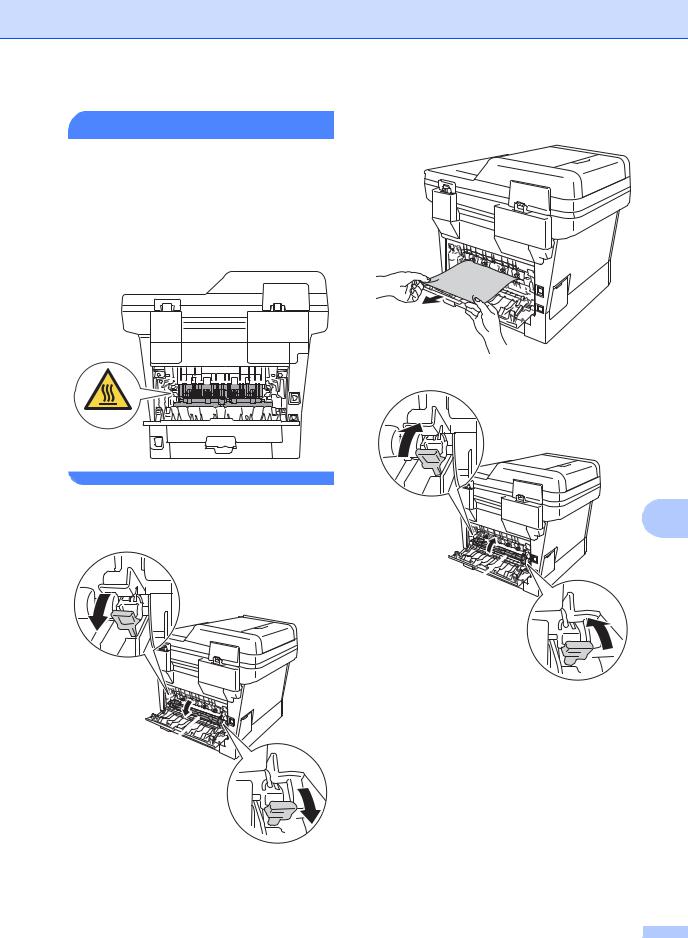
 WARNING
WARNING
 HOT SURFACE
HOT SURFACE
After you have just used the machine, some internal parts of the machine will be extremely hot. Wait for the machine to cool down before you touch the internal parts of the machine.
Troubleshooting
f Using both hands, gently pull the jammed paper out of the fuser unit.
g Close the fuser cover (1).
e Pull the green tabs at the left and right |
B |
hand sides toward you and fold down |
|
the fuser cover (1). |
|
1 
h Close the back cover.
1
75

i Put the drum unit and toner cartridge assembly back into the machine.
j Close the front cover of the machine.
Paper is jammed inside the machine
If the LCD shows Jam Inside, follow these steps:
a Leave the machine turned on for
10 minutes for the internal fan to cool the extremely hot parts inside the machine.
b Pull the paper tray completely out of the machine.
c Use both hands to slowly pull out the jammed paper.
76

Troubleshooting
 Note
Note
Pulling the jammed paper downward allows you to remove the paper easier.
d Press the front cover release button and then open the front cover.
B
e Slowly take out the drum unit and toner cartridge assembly. The jammed paper may be pulled out with the drum unit and toner cartridge assembly, or this may release the paper so you can pull it out from inside of the machine.
77

 WARNING
WARNING
 HOT SURFACE
HOT SURFACE
After you have just used the machine, some internal parts of the machine will be extremely hot. Wait for the machine to cool down before you touch the internal parts of the machine.
 Important
Important
•We recommend that you put the drum unit and toner cartridge assembly on a piece of disposable paper or cloth in case you accidentally spill or scatter toner.
•Handle the drum unit and toner cartridge assembly carefully. If toner scatters on your hands or clothes, immediately wipe or wash it off with cold water.
•To prevent damage to the machine from static electricity, DO NOT touch the electrodes shown in the illustration.
78

f Push down the green lock lever and take the toner cartridge out of the drum unit. Remove the jammed paper if there is any inside the drum unit.
g Put the toner cartridge back into the drum unit until you hear it lock into place. If you have put the cartridge in correctly, the green lock lever will lift automatically.
Troubleshooting
 Note
Note
Make sure that you put in the toner cartridge correctly or it may separate from the drum unit.
h Put the drum unit and toner cartridge assembly back into the machine.
i Close the front cover of the machine.
j Put the paper tray firmly back in the |
B |
machine. |
|
 Note
Note
If you turn off the machine while
Jam Inside is displayed, the machine will print incomplete data from your computer. Before you turn on the machine, delete the print job on your computer.
79

Paper is jammed in the duplex tray
If the LCD shows Jam Duplex, follow these steps:
a Leave the machine turned on for
10 minutes for the internal fan to cool the extremely hot parts inside the machine.
b Pull the paper tray completely out of the machine.
 WARNING
WARNING
 HOT SURFACE
HOT SURFACE
After you have just used the machine, some internal parts of the machine will be extremely hot. Wait for the machine to cool down before you touch the internal parts of the machine.
d Using both hands, gently pull the jammed paper out of the back of the machine.
c Open the back cover.
e Close the back cover.
80

f Pull the duplex tray completely out of the machine.
g Pull the jammed paper out of the machine or out of the duplex tray.
Troubleshooting
h Make sure that the jammed paper does not remain under the machine from static electricity.
i Put the duplex tray back in the machine.
j Put the paper tray firmly back in the machine.
B
81

If you are having difficulty with your machine
 Important
Important
•For technical help, you must call the country where you bought the machine. Calls must be made from within that country.
•If you think there is a problem with your machine, check the chart below and follow the troubleshooting tips. You can correct most problems by yourself.
•If you need additional help, the Brother Solutions Center offers the latest FAQs and troubleshooting tips.
Visit us at http://solutions.brother.com/.
Printing difficulties
Difficulties |
Suggestions |
||
No printout. |
Check that the correct printer driver has been installed and selected. |
||
|
|
||
|
Check to see if the LCD is showing an error message. |
||
|
See Error and maintenance messages uu page 63. |
||
|
|
||
|
Check the machine is online: |
||
|
(Windows® 7 and Windows Server® 2008 R2) |
||
|
Click the |
(Start) button and then Devices and Printers. Right-click Brother |
|
|
DCP-XXXX Printer and click See What's Printing. Click Printer and make sure |
||
|
Use Printer Offline is unchecked. |
||
|
(Windows Vista® and Windows Server® 2008) |
||
|
Click the |
(Start) button, Control Panel, Hardware and Sound, and then |
|
|
Printers. Right-click Brother DCP-XXXX Printer. Make sure that Use Printer |
||
|
Offline is unchecked. |
||
|
(Windows® XP and Windows Server® 2003) |
||
|
Click the Start button and choose Printers and Faxes. Right-click Brother |
||
|
DCP-XXXX Printer. Make sure that Use Printer Offline is unchecked. |
||
|
Contact your administrator to check your Secure Function Lock settings. |
||
|
|
||
|
(Middle East and Africa only) |
||
|
Check if the machine is in Power Down mode. |
||
|
Press any key on the control panel, and then re-send print data. |
||
|
uu Advanced User's Guide: Power Down mode |
||
|
|
||
The machine is not printing or has |
Press Stop/Exit. |
||
stopped printing. |
The machine will cancel the print job and clear it from the memory. The printout |
||
|
|||
|
may be incomplete. |
||
|
|
||
The headers or footers appear |
There is an unprintable area on the top and bottom of the page. Adjust the top and |
||
when the document displays on the |
bottom margins in your document to allow for this. |
||
screen but they do not show up |
See Unscannable and unprintable areas uu page 16. |
||
when it is printed. |
|||
|
|
||
|
|
||
The machine prints unexpectedly |
Press Stop/Exit to cancel print jobs. |
||
or it prints garbage. |
|
|
|
Check the settings in your application to make sure that it is set up to work with |
|||
|
|||
|
your machine. |
||
|
|
|
|
82

|
|
|
|
|
|
Troubleshooting |
|
|
Printing difficulties (continued) |
|
|
|
|
|
|
|
Difficulties |
Suggestions |
|
|
The machine prints the first couple |
Check the settings in your application to make sure that it is set up to work with |
|
|
of pages correctly, then some |
your machine. |
|
|
pages have text missing. |
|
|
|
Your computer is not recognising the machine’s input buffer’s full signal. Make |
|
|
|
|
|
|
|
|
sure that you have connected the interface cable correctly. |
|
|
|
uu Quick Setup Guide |
|
|
|
|
|
|
The machine does not print on both |
Check the paper size setting in the printer driver. You need to choose A4 (60 to |
|
|
sides of the paper even though the |
105 gsm). |
|
|
printer driver is set to Duplex. |
|
|
|
|
|
|
|
The machine does not change to |
When the machine is in Deep Sleep mode, the machine does not wake up even if |
|
|
Direct Print mode when a USB |
you connect a USB flash memory drive to the USB direct interface. |
|
|
flash memory drive is connected to |
Press Stop/Exit to wake up the machine. |
|
|
the USB direct interface. |
|
|
|
|
|
|
|
Cannot perform ‘Page Layout’ |
Check that the paper size setting in the application and in the printer driver are the |
|
|
printing. |
same. |
|
|
|
|
|
|
Print speed is too slow. |
Try changing the printer driver setting. The highest resolution needs longer data |
|
|
|
processing, sending and printing time. |
|
|
|
|
|
|
|
Check that the back cover is firmly closed and the duplex tray is firmly installed. |
|
|
|
|
|
|
|
Add optional memory. |
|
|
|
uu Advanced User's Guide: Installing extra memory |
|
|
|
|
|
|
The machine does not print from |
Try to reduce the print resolution. |
|
|
Adobe® Illustrator®. |
uu Software User's Guide: Printing (for Windows®) |
|
|
|
B |
|
|
|
uu Software User's Guide: Printing and Faxing (for Macintosh) |
|
|
|
|
|
|
|
|
|
|
Poor print quality |
See Improving the print quality uu page 88. |
|
|
|
|
|
83

Paper handling difficulties
Difficulties |
Suggestions |
|
The machine does not feed paper. |
If the LCD shows the Paper Jam message and you still have a problem, see Error |
|
|
and maintenance messages uu page 63. |
|
|
|
|
|
If there is no paper, load a new stack of paper into the paper tray. |
|
|
|
|
|
If there is paper in the paper tray, make sure it is straight. If the paper is curled, |
|
|
you should straighten it. Sometimes it is helpful to remove the paper, turn the stack |
|
|
over and put it back into the paper tray. |
|
|
|
|
|
Reduce the amount of paper in the paper tray, and then try again. |
|
|
|
|
|
Make sure that manual feed mode is not selected in the printer driver. |
|
|
|
|
|
Clean the paper pick-up roller. |
|
|
See Cleaning the paper pick-up rollers uu page 60. |
|
|
|
|
The machine does not feed paper |
Make sure that MP Tray is selected in the printer driver. |
|
from the MP tray. |
|
|
Fan the paper well and put it back in the tray firmly. |
||
|
||
|
|
|
The machine does not feed paper |
Fan the paper well and make sure the paper is under the maximum paper |
|
from the MP Tray when using a |
mark (1). Stagger the pages and put them in the tray until you feel the top page |
|
large stack of paper. |
touch the feed rollers as shown in the illustration. |
|
|
1 |
How do I print on envelopes?
You can load envelopes in the MP tray. Your application must be set up to print the envelope size you are using. This is usually done in the Page Setup or Document Setup menu of your application. (See your application’s manual for more information.)
84

|
|
|
|
|
|
Troubleshooting |
|
|
Copying difficulties |
|
|
|
|
|
|
|
Difficulties |
Suggestions |
|
|
Cannot make a copy. |
See How to copy uu page 26. |
|
|
|
|
|
|
|
Contact your administrator to check your Secure Function Lock Settings. |
|
|
|
|
|
|
Vertical black line appears in |
Black vertical lines on copies are typically caused by dirt or correction fluid on the |
|
|
copies. |
scanner glass, or the corona wire is dirty. Clean the glass strip and scanner glass |
|
|
|
and the white bar and also white plastic above them. |
|
|
|
See Cleaning the scanner glass uu page 53 and Cleaning the corona wire |
|
|
|
uu page 54. |
|
|
|
|
|
|
Copies are blank. |
Make sure you are loading the document correctly. |
|
|
|
See Using the automatic document feeder (ADF) uu page 24 or Using the |
|
|
|
scanner glass uu page 25. |
|
|
|
|
|
|
Scanning difficulties |
|
|
|
|
|
|
|
Difficulties |
Suggestions |
|
|
TWAIN or WIA errors appear when |
Make sure the Brother TWAIN or WIA driver is selected as the primary source in |
|
|
starting to scan. (Windows®) |
your scanning application. For example, in Nuance™ PaperPort™ 12SE, click |
|
|
|
Scan Settings, Select to choose the Brother TWAIN/WIA driver. |
|
|
TWAIN or ICA errors appear when |
Make sure the Brother TWAIN driver is selected as the primary source. In |
|
|
starting to scan. (Macintosh) |
PageManager, click File, Select Source and choose the Brother TWAIN driver. |
|
|
|
Mac OS X 10.6.x – 10.7.x users can also scan documents using the ICA Scanner |
|
|
|
Driver |
|
|
|
uu Software User's Guide: Scanning a document using the ICA driver (Mac OS X |
B |
|
|
10.6.x or greater) |
|
|
|
|
|
|
OCR does not work. |
Try increasing the scanning resolution. |
|
|
(for DCP-8110DN and |
(Macintosh users) |
|
|
DCP-8155DN) |
Presto! PageManager must be downloaded and installed before use. For further |
|
|
|
instructions, see Accessing Brother Support (Macintosh) uu page 5. |
|
|
|
|
|
|
Network scanning does not work. |
See Network difficulties (for DCP-8110DN and DCP-8155DN) uu page 86. |
|
|
(for DCP-8110DN and |
|
|
|
DCP-8155DN) |
|
|
|
|
|
|
|
Cannot scan. |
Contact your administrator to check your Secure Function Lock Settings. |
|
|
|
|
|
|
Software difficulties |
|
|
|
|
|
|
|
Difficulties |
Suggestions |
|
|
Cannot install software or print. |
(Windows® only) |
|
|
|
Run the Repair MFL-Pro Suite program on the CD-ROM. This program will repair |
|
|
|
and reinstall the software. |
|
|
|
|
|
85

Network difficulties (for DCP-8110DN and DCP-8155DN)
Difficulties |
Suggestions |
Cannot print over a wired Network. |
Make sure your machine is powered on, is online and in the Ready mode. Print |
|
the Network Configuration Report to verify your Network settings are correct. |
|
uu Advanced User's Guide: Network Configuration Report |
|
Reconnect the LAN cable to the hub to verify that the cable and network |
|
connections are good. If possible, try connecting the machine to a different port |
|
on your hub using a different cable. You can check the current wired network |
|
status from the Network control panel menu. |
|
|
|
For more information on Network problems: |
|
See Network User's Guide. |
|
|
The network scanning feature |
(Windows® and Macintosh) |
does not work. |
The network scanning feature may not work due to your firewall settings. Change |
|
or disable the firewall settings. It is necessary to set the third-party |
|
Security/Firewall Software to allow Network scanning. To add port 54925 for |
|
Network scanning, enter the information below: |
|
In Name: Enter any description, for example Brother NetScan. |
|
In Port number: Enter 54925. |
|
In Protocol: UDP is selected. |
|
Please refer to the instruction manual that came with your third-party |
|
Security/Firewall Software or contact the software manufacturer. |
|
For more details, you can read FAQs and troubleshooting suggestions at |
|
http://solutions.brother.com/. |
|
|
|
(Macintosh) |
|
Re-select your machine in the Device Selector application located in Macintosh |
|
HD/Library/Printers/Brother/Utilities/DeviceSelector or from the model list in |
|
ControlCenter2. |
|
|
The Brother software cannot be |
(Windows®) |
installed. |
If the Security Software warning appears on the PC screen during the installation, |
|
change the Security Software settings to permit the Brother product setup |
|
program or other programs to run. |
|
(Macintosh) |
|
If you are using a firewall function of anti-spyware or antivirus security software, |
|
temporarily disable it and then install the Brother software. |
|
|
86

|
|
|
|
|
|
|
|
Troubleshooting |
|
|
Other difficulties |
|
|
|
|
|
|
|
|
|
Difficulties |
Suggestions |
|
|
|
The machine will not turn on. |
Adverse conditions on the power connection (such as lightning or a power surge) |
|
|
|
|
may have triggered the machine’s internal safety mechanisms. Turn the machine |
|
|
|
|
off and unplug the power cord. Wait for ten minutes, then plug in the power cord |
|
|
|
|
and turn the machine on. |
|
|
|
|
If the problem is not solved and you are using a power breaker, disconnect it to |
|
|
|
|
make sure it is not the problem. Plug the machine's power cord directly into a |
|
|
|
|
different known working wall electrical socket. If there is still no power, try a |
|
|
|
|
different power cable. |
|
|
|
|
|
|
|
|
The machine cannot print EPS data |
(Windows®) |
|
|
|
that includes binary with the |
You need the following settings to print EPS data: |
|
|
|
BR-Script3 printer driver. |
a For Windows® 7 and Windows Server® 2008 R2: |
|
|
|
|
|
||
|
|
Click the |
(Start) button and then Devices and Printers. |
|
|
|
For Windows Vista® and Windows Server® 2008: |
|
|
|
|
Click the |
(Start) button, Control Panel, Hardware and Sound, and |
|
|
|
then Printers. |
|
|
|
|
For Windows® XP and Windows Server® 2003: |
|
|
|
|
Click the Start button, and select Printers and Faxes. |
|
|
|
|
b Right-click the Brother DCP-XXXX BR-Script3 icon and select |
|
|
|
|
Properties 1. |
|
|
|
|
c From the Device Settings tab, choose TBCP (Tagged binary |
B |
|
|
|
communication protocol) in Output Protocol. |
||
|
|
|
||
|
|
(Macintosh) |
|
|
|
|
If your machine is connected to a computer with a USB interface, you cannot print |
|
|
|
|
EPS data that includes binary. You can print EPS data at the machine via a |
|
|
|
|
network. To install the BR-Script3 printer driver over the network, visit the Brother |
|
|
|
|
Solutions Center at http://solutions.brother.com/. |
|
|
|
|
|
|
|
1For Windows® 7 and Windows Server® 2008 R2:
Printer properties, and Brother DCP-XXXX BR-Script3 if necessary
87

Improving the print quality
If you have a print quality problem, print a test page first (Menu, 3, 2, 3). If the printout looks good, the problem is probably not the machine. Check the interface cable connections and try printing a different document. If the printout or test page printed from the machine has a quality problem, check the following steps first. And then, if you still have a print quality problem, check the chart below and follow the recommendations.
 Note
Note
Brother does not recommend the use of cartridges other than Brother Original cartridges or the refilling of used cartridges with toner from other sources.
a To get the best print quality, we suggest using the recommended paper. Check that you use paper that meets our specifications. (See Acceptable paper and other print media
uu page 19.)
b Check that the drum unit and toner cartridge are installed correctly.
Examples of poor print |
Recommendation |
|||||
quality |
|
|||||
|
|
|
|
|
Take out the drum unit and toner cartridge assembly. Hold the |
|
|
|
|
|
|
assembly level with both hands and gently shake it from side to side |
|
ABCDEFGH |
several times to spread the toner evenly inside the cartridge. |
|||||
abcdefghijk |
If the LCD shows Replace Toner, put in a new toner cartridge. |
|||||
A B C D |
||||||
uu Replacing the toner cartridge uu page 41 |
||||||
a b c d e |
||||||
Check the machine’s environment. Conditions such as humidity, high |
||||||
0 1 2 3 4 |
||||||
temperatures, and so on, may cause this print fault. |
||||||
|
Faint |
uu Product Safety Guide: Choose a safe location for your product |
||||
|
|
|
|
|
If the whole page is too light, Toner Save may be turned on. Turn |
|
|
|
|
|
|
off Toner Save in the machine's menu settings or Toner Save |
|
|
|
|
|
|
Mode in the Printer Properties of the driver. |
|
|
|
|
|
|
uu Advanced User's Guide: Toner Save |
|
|
|
|
|
|
uu Software User's Guide: Printing (for Windows®) |
|
|
|
|
|
|
uu Software User's Guide: Printing and Faxing (for Macintosh) |
|
|
|
|
|
|
Clean the corona wire of the drum unit. |
|
|
|
|
|
|
uu Cleaning the corona wire uu page 54 |
|
|
|
|
|
|
Put in a new toner cartridge. |
|
|
|
|
|
|
uu Replacing the toner cartridge uu page 41 |
|
|
|
|
|
|
Put in a new drum unit. |
|
|
|
|
|
|
uu Replacing the drum unit uu page 47 |
|
|
|
|
|
|
|
|
88

Troubleshooting
Examples of poor print |
Recommendation |
||
quality |
|
||
|
|
|
Make sure that you use paper that meets our specifications. |
|
|
|
uu Acceptable paper and other print media uu page 19 |
|
ABCDEFGH |
||
|
Check the machine’s environment. Conditions such as high |
||
|
abcdefghijk |
||
|
A B C D |
temperatures and high humidity can increase the amount of |
|
|
background shading. |
||
|
a b c d e |
||
|
uu Product Safety Guide: Choose a safe location for your product |
||
0 1 2 3 4 |
|
||
|
Put in a new toner cartridge. |
||
|
|
|
|
Grey background |
uu Replacing the toner cartridge uu page 41 |
||
|
|
|
Put in a new drum unit. |
|
|
|
uu Replacing the drum unit uu page 47 |
|
|
|
|
|
|
|
Make sure that you use paper that meets our specifications. Rough- |
|
|
|
surfaced paper or thick paper may cause this problem. |
|
|
|
uu Acceptable paper and other print media uu page 19 |
|
|
|
Make sure that you choose the appropriate media type in the printer |
|
|
|
driver or in the machine’s Paper Type menu setting. |
|
uu Paper Type uu page 17 |
|
Ghosting |
uu Software User's Guide: Printing (for Windows®) |
|
uu Software User's Guide: Printing and Faxing (for Macintosh) |
|
|
|
B |
|
|
Choose Reduce Ghosting mode in the printer driver. |
|
|
|
uuSoftware User's Guide: Printing (for Windows®)
uuSoftware User's Guide: Printing and Faxing (for Macintosh)
Put in a new drum unit.
uuReplacing the drum unit uu page 47
Put in a new toner cartridge.
uuReplacing the toner cartridge uu page 41
The fuser unit may be contaminated. Call Brother customer service for support.
|
Make sure that you use paper that meets our specifications. Rough- |
|
|
surfaced paper may cause the problem. |
|
ABCDEFGH |
uu Acceptable paper and other print media uu page 19 |
|
abcdefghijk |
||
Clean the corona wire on the drum unit. |
||
A B C D |
||
|
||
a b c d e |
uu Cleaning the corona wire uu page 54 |
|
0 1 2 3 4 |
The drum unit may be damaged. Put in a new drum unit. |
|
Toner specks |
uu Replacing the drum unit uu page 47 |
|
The fuser unit may be contaminated. |
||
|
||
|
Call Brother customer service for support. |
89

|
|
|
|
|
|
|
|
|
|
|
|
|
|
|
|
|
|
|
|
|
|
|
Examples of poor print |
Recommendation |
|
||
|
|
quality |
|
|
||
|
|
|
|
|
Make sure that you use paper that meets our specifications. |
|
|
|
|
|
|
uu Acceptable paper and other print media uu page 19 |
|
|
|
|
|
|
Choose Thick Paper mode in the printer driver, choose Thick in the |
|
|
|
|
|
|
machine’s Paper Type menu setting or use thinner paper than you |
|
|
|
|
|
|
are currently using. |
|
|
|
|
|
|
uu Paper Type uu page 17 |
|
|
|
Hollow print |
uu Software User's Guide: Printing (for Windows®) |
|
||
|
|
uu Software User's Guide: Printing and Faxing (for Macintosh) |
|
|||
|
|
|
|
|
|
|
|
|
|
|
|
Check the machine’s environment. Conditions such as high humidity |
|
|
|
|
|
|
can cause hollow print. |
|
|
|
|
|
|
uu Product Safety Guide: Choose a safe location for your product |
|
|
|
|
|
|
The drum unit may be damaged. Put in a new drum unit. |
|
|
|
|
|
|
uu Replacing the drum unit uu page 47 |
|
|
|
|
|
|
|
|
|
|
|
|
|
Clean the corona wire inside the drum unit by sliding the green tab. |
|
|
|
|
|
|
Be sure to return the green tab to the home position (a). |
|
|
|
|
|
|
uu Cleaning the corona wire uu page 54 |
|
|
|
|
|
|
The drum unit may be damaged. Put in a new drum unit. |
|
|
|
|
|
|
uu Replacing the drum unit uu page 47 |
|
|
|
|
All black |
|
|
|
|
|
|
|
|
|
|
|
|
|
|
|
Make sure that you use paper that meets our specifications. A rough |
|
|
|
|
|
|
surfaced paper or thick print media can cause this problem. |
|
|
|
|
ABCDEFGH |
See Acceptable paper and other print media uu page 19. |
|
|
|
|
|
abcdefghijk |
Make sure that you choose the appropriate media type in the printer |
|
|
|
|
|
A B C D |
|
||
|
|
|
driver or in the machine’s Paper Type menu setting. |
|
||
|
|
|
a b c d e |
uu Paper Type uu page 17 |
|
|
|
0 1 2 3 4 |
uu Software User's Guide: Printing (for Windows®) |
|
|||
|
|
White lines across the page |
uu Software User's Guide: Printing and Faxing (for Macintosh) |
|
||
|
|
|
|
|
The problem may disappear by itself. Print multiple pages to clear this |
|
|
|
|
|
|
problem, especially if the machine has not been used for a long time. |
|
|
|
|
|
|
The drum unit may be damaged. Put in a new drum unit. |
|
|
|
|
|
|
uuReplacing the drum unit uu page 47 |
|
|
|
|
|
|
|
|
90

Troubleshooting
Examples of poor print |
Recommendation |
||||||||||
quality |
|
||||||||||
|
|
|
|
|
|
|
|
|
|
|
Clean the corona wire inside the drum unit. |
|
|
|
|
|
|
|
|
|
|
|
|
|
|
|
|
|
|
|
|
|
|
|
uu Cleaning the corona wire uu page 54 |
|
|
|
|
|
|
|
|
|
|
|
|
|
|
|
|
|
|
|
|
|
|
|
|
|
|
|
|
|
|
|
|
|
|
|
|
|
|
|
|
|
|
|
|
|
|
|
|
|
|
|
|
|
|
|
|
|
|
|
|
|
ABCDEFGH |
The drum unit may be damaged. Put in a new drum unit. |
|||||||||
|
|
|
|
|
|
|
|||||
|
|
|
|
|
|
|
|
|
|
|
|
|
abcdefghijk |
||||||||||
|
|
|
|||||||||
|
|
|
|
|
C D |
|
|||||
|
A B |
|
uu Replacing the drum unit uu page 47 |
||||||||
|
|
|
|
|
|||||||
|
|
|
|
|
|
|
c d e |
|
|||
|
a b |
|
|
||||||||
|
|
|
2 3 4 |
|
|
||||||
|
0 1 |
|
|
|
|||||||
|
|
|
|
|
|
||||||
|
|
|
|
|
|
|
|
|
|
|
|
Lines across the page
Check the machine's environment. Conditions such as high humidity and high temperatures may cause this print quality problem.
uu Product Safety Guide: Choose a safe location for your product
If the problem is not solved after printing a few pages, put in a new drum unit.
uu Replacing the drum unit uu page 47
White lines, bands or ribbing across the page
Make 10-15 copies of a blank, white sheet of paper. If the problem is not solved after printing the blank pages, the drum unit may have
foreign material, such as glue from a label, stuck on the drum. Clean |
B |
the drum unit. |
|
uu Cleaning the drum unit uu page 56 |
|
The drum unit may be damaged. Put in a new drum unit. |
|
uu Replacing the drum unit uu page 47 |
|
White Spots on black text and graphics at 94 mm intervals
Black Spots at 94 mm intervals
91

|
|
|
|
|
|
|
|
|
|
|
|
|
|
|
|
|
|
|
|
|
|
|
|
|
|
|
|
|
|
|
|
|
|
|
|
|
|
Examples of poor print |
Recommendation |
|
|||||||
|
|
quality |
|
|
|||||||
|
|
|
|
|
|
|
|
|
|
If you use label sheets for laser printers, the glue from the sheets may |
|
|
|
|
|
|
|
|
|
|
|
sometimes stick to the OPC drum surface. Clean the drum unit. |
|
|
|
ABCDEFGH |
|
|
|
|
uu Cleaning the drum unit uu page 56 |
|
|||
|
|
|
|
|
|
||||||
|
|
abcdefghijk |
|
||||||||
|
|
Make sure that you use paper that meets our specifications. |
|
||||||||
|
|
A B C D |
|
|
|||||||
|
|
|
|
|
|
|
|
|
|
||
|
|
a b c d e |
uu Acceptable paper and other print media uu page 19 |
|
|||||||
|
|
0 1 2 3 4 |
|
|
|
|
Do not use paper that has clips or staples because they will scratch |
|
|||
|
|
|
|
|
|
|
|
|
|
the surface of the drum. |
|
|
|
Black toner marks across the |
If the unpacked drum unit is in direct sunlight or room light, the unit |
|
|||||||
|
|
|
|
page |
may be damaged. |
|
|||||
|
|
|
|
|
|
|
|
|
|
The toner cartridge may be damaged. Put in a new toner cartridge. |
|
|
|
|
|
|
|
|
|
|
|
uu Replacing the toner cartridge uu page 41 |
|
|
|
|
|
|
|
|
|
|
|
The drum unit may be damaged. Put in a new drum unit. |
|
|
|
|
|
|
|
|
|
|
|
uu Replacing the drum unit uu page 47 |
|
|
|
|
|
|
|
|
|
|
|
|
|
|
|
|
|
|
|
|
|
|
|
Clean the corona wire inside the drum unit by sliding the green tab. |
|
|
|
|
|
|
|
|
|
|
|
uu Cleaning the corona wire uu page 54 |
|
|
|
|
ABCDEFGH |
|
|||||||
|
|
|
Make sure the green tab of the corona wire is at the home position (a). |
|
|||||||
|
|
|
abcdefghijk |
|
|||||||
|
|
|
A B C D |
The toner cartridge may be damaged. Put in a new toner cartridge. |
|
||||||
|
|
|
a b c d e |
uu Replacing the toner cartridge uu page 41 |
|
||||||
|
0 1 2 3 4 |
|
The drum unit may be damaged. Put in a new drum unit. |
|
|||||||
|
|
Black lines down the page |
uu Replacing the drum unit uu page 47 |
|
|||||||
|
|
|
|
||||||||
|
|
Printed pages have toner |
The fuser unit may be contaminated. |
|
|||||||
|
|
smudges down the page |
Call your Brother customer service for support. |
|
|||||||
|
|
|
|
|
|
|
|
|
|
|
|
|
|
|
|
|
|
|
|
|
|
Make sure that foreign material such as a torn piece of paper, sticky |
|
|
|
|
|
|
|
|
|
|
|
notes or dust is not inside the machine and around the drum unit and |
|
|
|
|
|
ABCDEFGH |
toner cartridge. |
|
|||||
|
|
|
|
abcdefghijk |
The toner cartridge may be damaged. Put in a new toner cartridge. |
|
|||||
|
|
|
|
A B C D |
|
||||||
|
|
|
|
uu Replacing the toner cartridge uu page 41 |
|
||||||
|
|
|
|
a b c d e |
|
||||||
|
|
|
|
The drum unit may be damaged. Put in a new drum unit. |
|
||||||
|
|
0 1 2 3 4 |
|
|
|
|
|||||
|
|
|
|
uu Replacing the drum unit uu page 47 |
|
||||||
|
|
White lines down the page |
|
||||||||
|
|
|
|
||||||||
|
|
|
|
|
|
|
|
|
|
|
|
92
